|
||||
|
|
Part I Reading and grammar Section 1 Randy  A farmer wanted to have his hens serviced, so he went to the market looking for a rooster. He was hoping he could get a special rooster, one that would service all of his many hens, and when he told this to the market vendor, the vendor replied, «I have just the rooster for you. Randy here is the horniest rooster you will ever see!» So the farmer took Randy back to the farm. Before setting him loose in the henhouse though, he gave Randy a little pep talk. «Randy,» he said, «I'm counting on you to do your stuff.» And without a word Randy strutted into the henhouse. Randy was as fast as he was furious, mounting each hen like a thunderbolt. There was much squawking and many feathers flying, till Randy had finished having his way with each hen. But Randy didn't stop there, he went into the barn and mounted all the horses, one by one and still at the same frantic pace. Then he went to the pighouse, where he did the same. The farmer, watching all of this with disbelief, cried out, «Stop, Randy, you'll kill yourself.» But Randy continued, seeking out each farm animal in the same manner. Well, the next morning, the farmer looked out and saw Randy lying there on his lawn. His legs were up in the air, his eyes rolled back, and his long tongue hanging out. A buzzard was already circling above Randy. The farmer walked up to Randy saying, «Oh you poor thing, look what you did, you've gone and killed yourself. I warned you, my little buddy.» «Shhhhh!» Randy whispered. «The buzzard's getting closer.» Study the words and expressions given below: to service обслуживать; зд. с.-х. огуливать, топтать, покрывать rooster петух vendorпродавец horny рогатый; зд. сленг озабоченный, похотливый pep сленг энергичный stuff зд. работа, работенка strut ходить с гордым, напыщенным видом furious яростный to mount взбираться squawk пронзительно кричать, верещать feathersперья frantic неистовый, разъяренный расе скорость, темп buzzard сарыч buddy сленг приятель he wanted to have his hens serviced он хотел, чтобы его кур покрыли (have sth done букв. устроить так, чтобы кто-то сделал что-л. для тебя) to set sb loose освободить кого-л., дать кому-л. волю to give sb a little talk поговорить с кем-л. to count on sb рассчитывать на кого-л. there was much squawking было много кудахтанья to have one's way with покончить с кем-л. to finish having закончить делать что-л. in the same manner тем же способом, в той же манере to roll back закатить (глаза) to get closer приблизиться Exercises to the text1. Answer the questions to the text: 1. Why did the farmer go to the market? 2. What sort of a rooster did he want to have? 3. What did the farmer tell Randy before setting him loose? 4. Where did Randy go after he had finished his way with the hens? 5. What was the farmer afraid of? 6. What did the farmer think when he saw Randy lying on the lawn? 7. What do you think Randy would do after he had finished with the buzzard? Don't you think the farmer is in danger? 2. Fill in the blanks with the words from the text: 1. A farmer wanted to have his hens _______. 2. He was hoping he could get a _______ rooster. 3. Before setting him _______, he gave him a little talk. 4. He mounted all the horses at the same _______ pace. 5. In the pighouse he did _______. 6. His legs were _______ in the air, his eyes rolled_______. 7. A buzzard was already _______ above Randy. 8. The buzzard's _______ closer. 3.Say if the statement is true or false: 1. A farmer wanted to have his pigs serviced. 2. Randy here is the horniest rooster you will ever see. 3. So the farmer took Randy to the farm. 4. Before setting him loose, he had a long talk with Randy. 5. Having finished his way with each hen, Randy stopped. 6. The farmer, watching all of this, cried out, «O.K., Randy, carry on!» 7. A buzzard was circling above Randy. 4. Match the words and expressions in the left column to those in the right one:  5. Translate from Russian into English: 1. Он отправился на рынок в поисках петуха. 2. У меня как раз есть для тебя петух. 3. Я рассчитываю на тебя, что ты сделаешь свою работенку. 4. Ни слова не говоря, Рэнди с гордым видом направился в курятник. 5. Было много пронзительный криков и летящих перьев. 6. Рэнди закончил свои дела с каждой курицей. 7. Фермер смотрел на это все с недоверием. 8. Бедняга, ты убил себя. Я тебя предупреждал. Revise English GrammarЛюбое предложение в английском языке, содержащее существительное, включает в свой состав и артикль – определенный, неопределенный или «нулевой»: А (неопределенный артикль) farmer wanted to have his («нулевой» артикль) hens serviced, so he went to the (определенный артикль) market looking for a rooster… Проверьте свои навыки использования артикля, при необходимости обращаясь к грамматическому комментарию (раздел 1). 6. Insert articles where necessary: 1. _______ farmer wanted to have his _______ hens serviced, so he went to _______ market looking for _______ rooster. 2. He wanted to find _______ very good rooster to service all his _______ hens, and when he told this to _______ market vendor, man answered. «I've just _______ rooster for you.» 3. "Randy here i isgreatest rooster you might have ever seen!"' 4. So farmer took Randy back to the farm. 7. Render the joke. Section 2 The Burglar A burglar had broken into a house late at night, in total darkness. He was working his way through the house making no noise when he heard a voice. He stopped and listened for a while and heard nothing. He continued his journey through the rooms looking for the one with all the «goodies» when he heard a voice again. This time he could faintly understand it. The voice said, «I see you and Jesus sees you.» This made the burglar just freeze, and he waited to see what would happen. Nothing, the burglar heard nothing for some time and resumed his search. Just then he heard the voice again, much louder this time, it said, «I see you and Jesus sees you.» This was puzzling to the burglar and he was about equally curious and scared, so he began working his way toward the voice. He entered another room and a voice in the room said, «I see you and Jesus sees you.» This scared the hell out of the burglar, and he just stood there motionless for about five minutes and heard no further noises. He then felt around and found a light switch and turned it on. There was a large bird cage with a parrot sitting in it. The parrot looked at the burglar and said, «I see you and Jesus sees you.» The burglar just grinned and went to work filling his bag and left the light in the room on. He had his bag about half full when he turned to look at the parrot again, this time he noticed that a Doberman Pincher was lying under the table that the bird cage was on. The parrot stared at the burglar and then said, «Sick him, Jesus.» Study the words and expressions given below: burglar взломщик total полный; полностью "goodies"сленг добро faint слабый to freeze замораживаться, застывать to resume возобновлять, приниматься снова search поиск to puzzle ставить в тупик equal равный curious любопытный to scare пугать motionless неподвижный switch выключатель parrot попугай to grin усмехаться, ухмыляться for a while в течение некоторого времени to break into вломиться to work one's way through (toward) прокладывать путь через (к) to scare the hell out of sb чертовски испугать to have sth about half full иметь что-л. наполненным наполовину to feel around пощупать вокруг Sick him! Взять! / Фас! Exercises to the text1. Answer the questions to the text: 1. What did the burglar hear when he was working his way through the house? 2. What room was he looking for? 3. What did the voice say? 4. What did the burglar feel around for? 5. Who was sitting in the cage? 6. Who was lying under the table that the bird cage was on? 7. What do you think happened to the burglar after the parrot had ordered the Pincher to do his stuff? 2. Fill in the blanks with the words from the text: 1. He waited to see what ______ happen. 2. The burglar heard nothing and ______ his search. 3. This was ______ to the burglar and he was about ______ curious and scared. 4. He began ______ his way toward the voice. 5. This scared ______ out of the burglar. 6. He ______ around and found ______ and turned it on. 7. The parrot looked at the burglar and said, «I see you and ______ sees you.» 3. Match the two parts of each sentence:  4. Match the words and expressions in the left column to those in the right one:  5. Translate from Russian into English: 1. Взломщик вломился в дом поздно ночью, в полной темноте. 2. Он остановился и прислушивался некоторое время. 3. Он стал искать комнату со всем добром. 4. Он едва понял эти слова. 5. Это заставило взломщика просто застыть. 6. Он возобновил свои поиски. 7. Взломщик был в равной степени испуган и заинтригован. Revise English GrammarВ предложении The burglar stood motionless for about five minutes and heard no further noises слова minutes и noises стоят в форме множественного числа. Они образованы путем прибавления окончания -s к основе слов minute минута и noise шум. Слово goodies также стоит во множественном числе, но образовано оно от слова goody и, очевидно, по другим правилам. По каким? Проверьте свои навыки образования формы множественного числа имен существительных (для справки см. грамматический комментарий, раздел 2, с. 240). 6. Put the words from the text into Plural form and read them according to the rules: burglar hell journey bird house minute room cage night noise time parrot way light search bag voice switch puzzle table 7. Render the joke. Section 3 Dead Dog  A woman goes to the vet. She says, «Doctor, I think there's something wrong with my dog. He hasn't moved all day.» The vet examines the dog and says, «I'm sorry. I'm afraid your dog is dead.» «Dead! How can he be dead? He was just fine yesterday. Are you sure he's dead? Isn't there some other test you can run?» The vet leaves and returns in a moment with a pet carrying case. He opens the case and a large cat emerges. The cat plods over to the dog and sniffs around its head. It then circles the dog, sniffing and poking around. After a minute or two the cat returns to its cage. «Well,» says the vet, «that pretty much proves it. He's dead.» «I guess you're right,» says the woman. She is coming to grips with what happened. «At least you did your best. How much do I owe you?» «$230.» «$230?! For what? All you did was tell me my dog was dead. What did you do that costs $230?» «Well it's $30 for the office visit,» says the vet, «and $200 for the cat scan.» Study the words and expressions given below: vet сокр. разг.veterinary ветеринарный врач to emerge появляться, возникать to plod тащиться, передвигаться с трудом to sniff нюхать, обнюхивать to poke тыкать; совать(ся) grip захват; способность понять, осознать что-л. to guess догадываться to owe быть должным to scan сканировать, исследовать to run a test провести анализ that pretty much proves it разг. это со всей очевидностью доказывает это to come to grips with sth осознавать, понять to do one's best сделать все, на что способен office visit посещение; зд. прием (уврача) cat scan сканирование с применением кота at least по крайней мере Exercises to the text1. Answer the questions to the text: 1. What does the woman think about her dog? 2. What did the vet return with? 3. In what way did the cat perform his test? 4. How much did the doctor think the woman owed him? 5. How much was the cat scan? 2. Fill in the blanks with the words from the text: 1. How can he _______ dead? 2. «Isn't there some other test you can _______?» 3. The vet _______ and returns with a case, and a large cat. 4. The cat _______ around the dog's head. 5. After a minute or _______ the cat returns. 6. I _______ you're right. 7. At _______ I did my best. 8. How much do I _______ you? 9. All you did was perform a cat _______. 3.Say if the statements are false or true: 1. The dog hasn't moved all week. 2. The vet says, «I'm sorry. I'm afraid your dog is ill.» 3. He was just fine yesterday. 4. The vet leaves and never returns. 5. He opens the case and a large cat emerges. 6. After a minute or two the vet returns to its cage. 7. «How much do I owe you?» – «$530.» 4. Match the words and expressions in the left column to those in the right one:   5. Translate from Russian into English: 1. Доктор, я думаю, с моей собакой что-то неладно. 2. Она целый день не двигалась. 3. Доктор осмотрел собаку. 4. Вы уверены, что она умерла? 5. Нет ли других анализов, которые вы могли бы провести? 6. Он открыл коробку, и появился большой кот. 7. Кот понюхал вокруг собачьей головы. 8. Что вы сделали такого, что стоит 230 долларов? 24 6. Find English equivalents to the Russian words in the scanword. The hidden words are positioned both horizontally and vertically, as well as on diagonals:  1. (r…) петух, 2. (f…) перья, 3. (с…) любопытный, 4. (m…) неподвижный, 5. (s…) включать, 6. (f…) замерзать, 7. (s…) обслуживать, 8. (f…) яростный, 9. (r…) возобновлять, 10. (е… ) появляться. Revise English GrammarВ предложениях A woman goes to the vet; Doctor, I think there's something wrong with my dog используется так называемое простое настоящее время; в предложении Не hasn't moved all day — настоящее совершенное время; в предложении She is coming to grips with what happened — настоящее длительное время. Проверьте, правильно ли вы используете три основные формы настоящего времени (в случае необходимости воспользуйтесь грамматическим комментарием; раздел 3). 7.Fill in the blanks with appropriate Present forms of the verbs given in brackets: 1. The woman (to visit)the vet every other day. 2. The dog (not to move)since yesterday. 3. The vet (to examine)the dog at the moment. 4. (to be)my dog dead? 5. What test you (to run)now? 6. "I (to leave)at the moment, and will return in a minute," said the vet. 7. "What you (to carry)in this case?" asked the woman. 8. I (to open)this case every morning. 9. You (ever to see)such a cat before? 10. No, I (never to see)such a cat in all my life. 11. What he (to sniff)around at present? 12. Why he (to circle)my dog? 13. How much I (to owe)you? Revise English GrammarЖенщина, пришедшая к ветеринару, задает множество вопросов, которые подразделяются на несколько видов: Основные виды вопросительных предложений – общий и специальный вопросы. Проверьте навыки постановки данных вопросов, при необходимости обращаясь к грамматическому комментарию; раздел 3. 8.Make general questions to the sentences given below: 1. A woman goes to the vet. 2. There's something wrong with my dog. 3. He hasn't moved all day. 4. I'm afraid your dog is dead. 5. The vet leaves and returns in a moment. 6. He opens the case. 7. A large cat is emerging. 8. The cat is plodding over to the dog. 9.Make as many special questions as you can to the sentences given below: 1. The dog hasn't moved all day. 2. The vet leaves and returns in a moment. 3. After a minute or two the cat returns to its cage. 10.Render the joke. Section 4 The Parrot And The Magician A magician was working on a cruise ship in the Caribbean. The audience would be different each week, so the magician allowed himself to do the same tricks over and over again. There was only one problem: the captain's parrot saw the shows each week and began to understand how the magician did every trick. Once he understood he started shouting in the middle of the show. «Look, it's not the same hat.» «Look, he is hiding the flowers under the table.» «Hey, why are all the cards the Ace of Spades?» The magician was furious but couldn't do anything; it was, after all, the captain's parrot. One day the ship had an accident and sank. The magician found himself on a piece of wood in the middle of the ocean with the parrot, of course. They stared at each other with hate, but did not utter a word. This went on for a day, and another and another. After a week the parrot said. «OK, I give up. Where's the boat?» Study the words and expressions given below: magician фокусник cruise круиз to stare уставиться to allow oneself позволять себе over and over again снова и снова to start shouting начинать кричать the Ace of Spades карт. туз пик to utter a word произносить слово to give up сдаваться Exercises to the text1. Answer the questions to the text: 1. What sort of a ship the magician was working on? 2. What did the magician allow himself to do each week? 3. What did the captain's parrot begin to understand? 4. What did he shout in the middle of the show? 5. Why couldn't the magician do anything? 6. Where did the magician find himself after the ship had sunk? 7. Why did the parrot give up? 2. Fill in the blanks with the words from the text: 1. The ______ would be different each week. 2. The magician allowed himself to do ______ tricks. 3. Once the parrot understood he started ______. 4. Look, he is ______ the flowers. 5. The magician was ______ but couldn't do anything. 6. One day the ship had an ______ and sank. 7. They ______ at each other with hate. 3. Match the two parts of each sentence:  4. Match the words and expressions in the left column to those in the right one:  5. Translate from Russian into English: 1. Там была только одна проблема. 2. Попугай начал понимать, как фокусник делает свои фокусы. 3. Однажды поняв, он принялся кричать в середине представления. 4. Смотрите, он прячет цветы в шляпе. 5. Фокусник был в бешенстве, но он не мог ничего поделать. 6. В конце концов, это был попугай капитана. 7. Так продолжалось день, потом другой и еще один. Revise English GrammarВ предложениях A magician was working on a cruise ship и The magician allowed himself to do the same tricks over and over again используются две основные формы прошедшего времени английского глагола – прошедшее длительное и прошедшее простое. В вопросе Where did the magician find himself after the ship had sunk? используется третья основная форма прошедшего времени английского глагола – прошедшее совершенное время. Проверьте свои знания этих временных форм (в случае необходимости используйте грамматический комментарий; раздел 4). 6. Fill in the blanks with appropriate forms of the verbs: 1. When the magician worked on a cruise ship he (to allow) _______ himself to do one and the same trick over and over again. 2. The magician (to hide) _______ the flowers under the table while he was doing his tricks. 3. There (to be) _______ only one problem yesterday. 4. There (to be) _______ three problems yesterday. 5. As soon as the captain (to see) _______ the show he started shouting at the magician. 6. He (to shout) _______ all day long. 7. After the ship (to sink) _______ the magician found himself on a log of wood. 8. When a week (to pass) _______ , the parrot (to say) _______ that he was giving up. 7. Make as many special questions to the sentences given as possible: 1. A magician was working on a cruise ship in the Caribbean. 2. The captain's parrot began to understand how the magician did every trick. 3. He started shouting in the middle of the show. 4. He is hiding the flowers under the table. 5. The magician found himself on a piece of wood in the middle of the ocean with the parrot. 8. Render the joke. Section 5 Parrots  One lady approaches a priest and tells him, «Father, I have a problem. I have these two talking female parrots, but they only know how to say one thing.» «What do they say?» the priest asked. "They only know how to say 'Hi, we are prostitutes. Do you want to have some fun?' " «That's terrible!» the priest exclaimed. «But I have a solution to your problem. Bring your parrots over to my house and I will put them with my two male talking parrots whom I have taught to pray and read the Bible. Then my parrots will teach your parrots to stop saying that terrible phrase and your female parrots will learn to pray and worship.» «Oh, thank you, Father!» said the lady. So the next day, the lady brings her female parrots to the priest's house. The priest's two male parrots are holding rosary beads and praying in their cage. The lady puts her female talking parrots in with the male talking parrots, and the female parrots say, «Hi, we are prostitutes! Do you want to have some fun?» One male parrot looks over to the other and says, «Put the Bible away! Our prayers have been answered!» Study the words and expressions given below: to approach приближаться female особь женского пола male особь мужского пола Hi! Привет! prostitute проститутка to exclaim восклицать solution решение to pray молить(ся) to worship боготворить the Bible Библия rosary beads четки to have some fun развлекаться to stop saying прекратить говорить our prayers have been answered наши молитвы были услышаны Exercises to the text1. Answer the questions to the text: 1. How many things do the lady's parrots know how to say? 2. What do they call themselves? 3. Who offered help to the lady? 4. What has the priest taught his parrots to do? 5. What does the priest think his parrots will teach the lady's ones to do? 6. What do the male parrots hold? 7. What have the male parrots been actually begging the Lord for? 2. Fill in the blanks with the words from the text: 1. That's _______ ! 2. I have a _______ to your problem. 3. _______ your parrots over to my house. 4. I have _______ my parrots to pray and read the Bible. 5. The lady _______ her female parrots to the priest's house. 6. The male parrots are _______ rosary beads. 7. «Do you want _______ some fun?» 8. One male parrot looks _______ to the other and says, «Put the Bible away». 3. Say if the statement is true or false: 1. I have twenty-three talking female parrots. 2. "They only know how to say 'Hi, we are insurance agents. Do you want to have some fun?' " 3. My parrots will teach your parrots to stop saying that terrible phrase. 4. Your female parrots will learn to play. 5. The lady brings her female parrots to the priest's house. 6. The priest's two male parrots are holding a party in their cage. 7. The lady puts her female talking parrots in with the male talking parrots. 4. Match the words and expressions in the left column to those in the right one:  5. Translate from Russian into English: 1. Одна дама подходит к священнику и говорит ему: «Отец, у меня проблема». 2. Они только и знают, что говорить «Привет!» 3. «Это ужасно!» – воскликнул священник. 4. Мои попугаи отучат ваших говорить эти ужасные вещи. 5. Отложи Библию. 6. Наша молитва была услышана. Revise English GrammarВ предложении I will put them with my two male talking parrots, and my parrots will teach your parrots to stop saying that phrase используется одна из форм будущего времени английского глагола – простое будущее время. Проверьте свои знания этой формы (при необходимости воспользуйтесь грамматическим комментарием; раздел 5). 6. Fill in the blanks with appropriate Future forms of the verbs given in brackets, where necessary: 1. The lady (to visit) _______ the priest next Tuesday. 2. These parrots never (to say) _______ such things again. 3. The priest's two male talking parrots (to pray and read the Bible) _______ from six till seven tomorrow. 4. My parrots (to teach) _______ your parrots to stop saying that terrible phrase. 5. They (to teach) _______ them to pray and worship by next Sunday. 6. «I will solve your problem,» the priest said, «if you (to bring) _______ your parrots over to my house.» 7. Tell me, when you (to bring) _______ your parrots. 7.Make as many special questions to the sentences given as possible: 1. I will buy these two talking female parrots. 2. But I will have a solution to your problem. 3. I will put them with my two male talking parrots. 4. My parrots will teach your parrots to stop saying that terrible phrase. 5. Your female parrots will learn to pray and worship. 8.Insert articles where necessary: 1. One lady approaches _______ priest. 2. Father, I have _______ problem. 3. I have these two _______ talking female parrots. 4. "What do they say? _______ priest asked. 5. Do you want to have some _______ fun? 6. I have _______ solution to your problem. 7. Thank you, _______ Father! 8. The priest's two male _______ parrots are holding rosary beads. 9. Render the joke. Section 6 Two bulls  There were two bulls, a young one named George and an old one named Sam. It was that time of year to satisfy the local female population, and young George was pretty excited. «Sam, Sam, can I go down to those heifers over there?» asked George. «George, relax. Here is how it works. We'll wait until they're lined up at the feed trough so we can have our way with the ladies in a nice orderly fashion,» said Sam. «Okay, I can do that,» George answered. Well, feeding time came and all the heifers were lined up just like Sam said, and George was all excited to go down there, but Sam had a few more instructions. «Now, George, here is how this is gonna work. I'll start at one end, and you can start at the other. We'll meet in the middle,» said Sam. «OK, OK, let's go!» said George. «Hang on, George! One more important thing to remember. These gals will let us have our way but you have to show some respect and be polite. OK?» said Sam. «Sure,» says George. Well, they go on down to the heifers all lined up. George starts at one end and Sam at the other. George is pretty excited, but he remembers Sam's instructions about being polite, so as he is going along he makes sure to say, «Thank you ma'am, thank you ma'am, thank you ma'am, thank you ma'am, thank you ma'am, sorry Sam, thank you ma'am…» Study the words and expressions given below: bull бык to satisfy удовлетворять local местный population население heifer телка to relax расслабляться to line up выстраивать(ся) feed trough кормушка gal сленг girl девушка ma'am разг.madam мадам pretty excited разг. сильно возбужденный here is how it works вот как это работает in a nice orderly fashion чинно; стройными рядами feeding time время кормления Hang on! разг. Погоди! a few more еще немного is gonna разг., сленг is going to this is gonna work это будет работать to show respect показать (выказать) уважение Sure! Точно! / Конечно! to make sure удостовериться, делать наверняка Exercises to the text1. Answer the questions to the text: 1. How many bulls were there? 2. What were their names? 3. Why was George pretty excited? 4. Where did he want to go and why? 5. Why did Sam suggest that they wait until the heifers were lined up at the feed trough? 6. Where did Sam and George plan to meet? 7. Did they meet? 8. Wasn't Sam a real gentleman? 9. Wasn't George a gentleman, either? 2. Fill in the blanks with the words from the text: 1. There were two bulls, a young _______ named George and an old _______ named Sam. 2. It was that time of year _______ the local female population. 3. Young George was _______ excited. 4. George, _______. 5. We'll wait _______ they're lined up at the feed trough. 6. Feeding time came and all the heifers were _______ up. 7. Now, George, here is how this is _______ work. 8. One more important thing _______. 9. He remembers Sam's instructions about _______ polite. 3. Match the two parts of each sentence:  4. Match the words and expressions in the left column to those in the right one:  5. Translate from Russian into English: 1. Молодой Джордж был здорово возбужден. 2. Пришло время кормления. 3. У Сэма было еще несколько советов. 4. Вот как это будет работать. 5. Встретимся в середине. 6. Погоди, Джордж. Стоит запомнить еще одну важную вещь. 7. Окажи им уважение и будь вежлив. Revise English GrammarВ предложениях There were two bulls… It was that time of year… мы имеем дело с конструкциями, в которых в качестве формального подлежащего используются местоимения there и it, сочетающиеся как со сказуемым с глаголом to be. Проверьте, правильно ли вы используете эти конструкции в утвердительных и отрицательных предложениях (при необходимости см. грамматический комментарий; раздел 6). 6. Fill in the blanks: 1. How many bulls (was, were) _______ there on the farm? 2. (It, There) _______ was that time of year when bulls were pretty excited. 3. (It, There) _______ was the heifers that were lined up at the feed trough. 4. There (was, were) _______ a bull and some heifers there. 5. (There, It) _______ is one more important thing to remember. 6. (There, It) _______ was spring and the bulls were pretty excited. 7. (There, It) _______ was George who well remembered Sam's instructions about being polite. 7. Put the verbs in brackets into appropriate forms: 1. Two bulls (to want) _______ to satisfy all the local female population last year. 2. Sam (to go) _______ down to those heifers over there yesterday. 3. We (to wait) _______ until they're lined up at the feed trough. 4. We (to have) _______ our way with the ladies in a nice orderly fashion in five minutes. 5. Feeding time (just to come) _______. Line up! 6. Sam (to start) _______ at one end, and George started at the other. 7. We (to meet) _______ very soon. You'll have to wait a little. 8. Are you (to show) _______ respect to these ladies? 8. Find English equivalents to the Russian words in the scanword:  1. (p… ) население, 2. (t… ) кормушка, 3. (s… ) удовлетворять, 4. (r… ) расслабляться, 5. (f… ) кормление, 6. (r.. ) уважение, 7. (f…) особь женского пола, 8. (е…) восклицать, 9. (а…) позволять, 10. (р…) молиться. 9. Render the joke. Section 7 Pig farm A farmer got a good deal on a dozen pigs at an auction. When he got them home he realized they were all females so he talked to his neighbor to see if he could bring his girl pigs over to meet with his boy pigs so this man could get some babies. The neighbor agreed and so the farmer loaded the girl pigs in his truck to visit the neighbor's pigs. That night he went back to pick them up and he asked his neighbor, «How will I know if they are going to have little pigs?» The neighbor said that they would start acting real different and that he could just tell. So next morning he went and checked his pigs and they were just acting normal so he took them back to the neighbor's again. Next morning same thing no change so he took them back. Next morning he was sitting at the table and he said to his wife, «Honey, look out the window and see if the pigs are acting different.» She looked out the window and said, «Well, I don't know how different you mean but eleven of them are in the back of the truck and one is behind the wheel honking the horn!!!» Study the words and expressions given below: auction аукцион to realize осознавать to load грузить truck грузовик to check проверять honey мед; зд. дорогая wheel колесо; зд. рулевое колесо, баранка to honk сигналить, гудеть horn рог; зд. клаксон to get a good deal on sth разг. совершить удачную покупку чего-л. to get sth home разг. привезти, доставить что-л. домой to start acting real different разг. начать вести себя действительно не так next morning разг.the next morning to be just acting normal разг. просто вести себя обычно same thing no change разг. то же самое и никаких изменений neighbor's соседский (дом, ферма) to look out the window разг.to look out of the window back of the truck зд. кузов грузовика Exercises to the text1. Answer the questions to the text: 1. How many pigs did the farmer get at the auction? 2. What did he realize when he got home? 3. What did he speak with his neighbor about? 4. How did he get the pigs to the neighbor's farm? 5. How could the farmer get to know if his girl pigs were going to have babies? 6. How were the pigs acting after the farmer had brought them from his neighbor's for the first time? 7. How were they acting when the farmer's wife saw them out of the window? 2. Fill in the blanks with the words from the text: 1. A farmer got a good _______ on a dozen pigs. 2. When he got them home he _______ they were all females. 3. He wanted to bring his girl pigs _______ to the neighbor's boy pigs _______ they could get some baby pigs. 4. The farmer _______ the girl pigs in his truck. 5. That night he went back _______ them up. 6. They would start acting real_______ . 7. Next morning he went and _______ his pigs. 3. Say if the statements are true or false: 1. A farmer got a good deal on a hundred dozen pigs at an auction. 2. When he got them home he realized they were all females. 3. The neighbor agreed and so the farmer loaded the boy pigs in his truck. 4. The neighbor said that they wouldn't act real different. 5. Next morning he was sitting at the table and he asked his wife if the pigs were acting different. 6. One of them is in the back of the truck and eleven are behind the wheel honking the horn. 4. Match the words and expressions in the left column to those in the right one:  5. Translate from Russian into English: 1. Он поговорил со своим соседом, чтобы удостовериться, не может ли он привезти к нему своих поросят. 2. Сосед согласился, и фермер погрузил своих поросят на грузовик. 3. Тем же вечером он отправился назад, чтобы забрать их. 4. Как я узнаю, не собираются ли они иметь маленьких поросят? 5. Дорогая, выгляни в окно и посмотри, не ведут ли себя поросята необычно. 6. Одиннадцать из них – в кузове грузовика, а одна – за баранкой и сигналит. Revise English GrammarВ предложениях The neighbor said that they would start acting real different… So next morning they were just acting normal… содержится характерное для разговорной речи нарушение согласования глагола и наречия – последнее заменено на прилагательное. Нормативное согласование глагола и определяющих его частей речи предполагает следующую форму: The neighbor said that they would really start acting differently… So next morning they were just acting normally…, где обстоятельство образа действия выражено не прилагательным, а наречием. Вместе с тем и в нормативном употреблении есть исключения. Проверьте, насколько хорошо вы знакомы с правилом согласования глагола и наречия/прилагательного (в случае необходимости см. грамматический комментарий; раздел 7). 6.Fill in the blanks choosing the appropriate variant of the words in brackets: 1. What you say about your boy pigs sounds really (good, well) _______. 2. The neighbor (happy, happily) _______ agreed and so the farmer (quick, quickly) _______ loaded his pigs in the truck. 3. Honey, look out the window and see if the pigs are acting (different, differently) _______. 4. Eleven of them are in the back of the truck and one is behind the wheel honking the horn rather (loud, loudly) _______. 5. The farmer could (hard, hardly) _______ get his girl pigs home – so (happy, happily) _______ they were. 7.Make as many special questions as possible: 1. A farmer got a good deal on a dozen pigs at an auction. 2. The farmer loaded the girl pigs in his truck to visit the neighbor's pigs. 3. The neighbor said that they would start acting real different. 4. Next morning he went and checked his pigs. 5. Next morning he was sitting at the table. 8.Render the joke. Section 8 Darling, i have a confession A young couple were on their honeymoon. The husband was sitting in the bathroom on the edge of the bathtub saying to himself, «Now how can I tell my wife that I've got really smelly feet and that my socks absolutely stink? I've managed to keep it from her while we were dating, but she's bound to find out sooner or later that my feet stink. Now how do I tell her?» Meanwhile, the wife was sitting in the bed saying to herself, «Now how do I tell my husband that I've got really bad breath? I've been very lucky to keep it from him while we were courting, but as soon as he's lived with me for a week, he's bound to find out. Now how do I tell him gently?» The husband finally plucks up enough courage to tell his wife and so he walks into the bedroom. He walks over to the bed, climbs over to his wife, puts his arm around her neck, moves his face very close to hers and says, «Darling, I've a confession to make.» And she says, «So have I, love.» He cries out, «Don't tell me you've eaten my socks!» Study the words and expressions given below: confession признание couple пара honeymoon медовый месяц edge край bathtub ванна smelly пахучий, вонючий to stink вонять to manage удаваться, преуспевать в чем-л. to date зд. встречаться до брака meanwhile тем временем breath дыхание to court ухаживать gently мягко to climb забираться hers ее to keep sth from sb скрывать что-л. от кого-л. to be bound быть вынужденным to find out обнаруживать sooner or later рано или поздно to be lucky быть удачливым as soon as как только, так… to pluck up enough courage собраться с духом So have I. И я тоже. Exercises to the text1. Answer the questions to the text: 1. Where was the husband sitting? 2. What did he worry about? 3. Guess how he had managed to keep his socks as well as his feet away from his would-be wife while they were dating? 4. Where was the wife sitting? 5. How long would it take the man to learn everything about his wife's breath, she thought? 6. Why did the man think that his wife had eaten his socks? 2. Fill in the blanks with the words from the text: 1. A young couple _______ on their honeymoon. 2. How can I tell my wife that my socks _______ stink? 3. I've _______ to keep it from her while we were dating. 4. I've been very _______ to keep it from him. 5. He's _______ to find out. 6. How do I tell him _______? 7. Darling, I've a _______ to make. 8. So have I, _______. 3. Match the two parts of each sentence:  4. Match the words and expressions in the left column to those in the right one:  5. Translate from Russian into English: 1. Рано или поздно она вынуждена будет обнаружить это. 2. Тем временем жена сидела в постели. 3. Мне удавалось делать это, пока мы встречались. 4. Как мне сказать ему об этом мягко? 5. Муж наконец собирается с духом. 6. Он забирается к своей жене, обвивает ее шею своей рукой и говорит. 7. Я тоже, любовь моя. Revise English GrammarВ предложении A young couple were on their honeymoon… подлежащее, выраженное существительным в форме единственного числа, согласуется со сказуемым, выраженным глаголом во множественном числе. Проверьте свои знания согласования подлежащего и сказуемого в английском предложении. В случае необходимости используйте грамматический комментарий (раздел 8). 6. Choose the appropriate form of the verb: 1. The husband, as well as his wife, (was, were) _______ in the hotel. 2. It (was, were) _______ the young couple who rented the apartment. 3. Both the husband and the wife (was, were) _______ bound to find it out. 4. Everyone in the house (know, knows) _______ that they have left. 5. Both (was, were) _______ afraid to confess their secrets to each other. 6. A pair of his socks (was, were) _______ lying on the table. 7. Neither my wife nor her relatives (know, knows) _______ that my feet stink. 8. The number of married couples in our hotel (is, are) _______ growing. 9. Honeymoon Jokes (is, are) _______ the most funny section of the book. Revise English GrammarВ предложении And she says, «So have I, love»… используется краткая форма выражения солидарности с предыдущей репликой диалога. Таких форм – положительных и отрицательных – существует несколько. Проверьте свои знания данных форм, при необходимости обращаясь к грамматическому комментарию (раздел 9). 7. Fill in the blanks with appropriate forms. Follow the directions given: Model: 1. We were on our honeymoon. (They – so): So were they. 2. The husband wasn't sitting in the bathroom. (I – neither): Neither was I. 1. I've got really smelly feet. (they – too) 2. My socks absolutely stink. (mine – also) 3. I didn't manage to keep it from her. (we – either) 4. We weren't dating. (they – neither) 5. I've been very lucky to keep it from him. (she – so) 6. The husband has finally plucked up enough courage. (I – so) 7. He hadn't walked into the bedroom. (she – either) 8. He won't walk over to the bed. (I – neither) 9. He didn't put his arm around her neck. (I – either) 10. He moves his face very close to hers. (I – too) 11. I've a confession to make. (she – so) 8. Insert articles where necessary: 1. The husband was sitting in _______ bathroom on edge of the bathtub. 2. I've got really smell _______ feet and my socks absolutely stink. 3. I've managed to keep it from _______ her while we were dating. 4. The wife was sitting in _______ bed. 5. How do I tell my _______ husband that I've got really badbreath? 6. The husband plucks up enoug _______ hcourage. 7. He walks into _______ bedroom. 8. He puts his arm around her _______ neck. 9.Render the joke. Section 9 Wedding night practical jokes A couple was planning on getting married. Seeing how they didn't have much money to go on a honeymoon, they decided to just go back to their new apartment after the wedding. The groom had three close friends, that were prone to committing practical jokes. One being a carpenter, the other an ordinary guy, and the third a dentist. They all decided to pull practical jokes on their newly married friends. The carpenter decided he would cut the slats in the bed so that when they climbed into bed, the bed would collapse. The ordinary guy decided to short-sheet the bed, so that when they got into it their feet wouldn't reach the bottom. The dentist chuckled and wouldn't tell anyone what he planned to do. A week later the three friends all received letters in the mail. «Dear friends, we didn't mind the fact that when we got into bed, the bed collapsed, or the guy that short-sheeted it, but I'm gonna kill the bastard that put the novacaine in the vaseline!» Study the words and expressions given below: groom жених to commit совершать, устраивать carpenter плотник ordinary обычный guy парень dentist дантист slat перекладина to collapse падать, рушиться bottom низ to chuckle хихикать to mind возражать, иметь что-либо против bastard ублюдок novacaine новокаин vaseline вазелин to plan on doing sth планировать сделать что-л. to be prone to doing sth иметь склонность к чему-л. close friend близкий друг practical joke розыгрыш to pull a joke on sb подшутить над кем-л. newly married молодожены to short-sheet подвернуть простыню под матрац Exercises to the text1. Answer the questions to the text: 1. Why did the couple decide to just go back to their new apartment after the wedding? 2. What were the groom's close friends prone to committing? 3. What were they? 4. How did the carpenter decide to make fun of the newly married couple? 5. What did the ordinary guy decide to do? 6. Why didn't the dentist say what he was going to do? 7. How long did it take the newly married couple to write letters to their friends? 8. What was the young husband going to do with the dentist? 2. Fill in the blanks with the words from the text: 1. A couple was planning on _______ married. 2. They decided to _______ go back to their new apartment. 3. The groom had three _______ friends. 4. They were prone to _______ practical jokes. 5. They decided to _______ a practical joke on their friends. 6. The carpenter decided he _______ cut the slats. 7. The bed would _______. 8. Their feet didn't _______ the bottom. 3. Say if the sentences are true of false: 1. They decided to just go to Italy after the wedding. 2. The groom had three close friends. 3. The carpenter decided he would put the novacaine in the vaseline. 4. The ordinary guy decided to short-sheet the bed. 5. The dentist chuckled and told he would pull the bride's teeth out. 6. A week later the three friends all received telegrams. 4. Match the words and expressions in the left column to those in the right one:  5. Translate from Russian into English: 1. Парочка собиралась пожениться. 2. У жениха было трое близких друзей. 3. Они имели склонность к розыгрышам. 4. Плотник решил, что он подрубит перекладины на постели. 5. Дантист усмехнулся и никому не захотел сказать, что он собирается сделать. 6. Я убью ублюдка! Revise English grammarВ предложении The carpenter decided he would cut the slats… используется не встречающаяся в русском языке временная форма глагола – будущее-в-прошедшем время. Она образуется при помощи вспомогательного глагола would. Этот же глагол – в другом значении – используется в предложении The dentist chuckled and wouldn't tell anyone what he planned to do… Проверьте, насколько хорошо вы владеете этой формой глагола, при необходимости обращаясь к грамматическому комментарию (разделы 10, 11). 6. Fill in the blanks with appropriate forms of the verbs: 1. As the young couple didn't have much money to go on a honeymoon, they decided that they (to go back) _______ to their new apartment after the wedding. 2. The groom's close friends thought that they (to act) _______ wisely if they (to commit) _______ some practical jokes on their newly married friends. 3. The carpenter decided he (to cut) _______ the slats. 4. They thought that when the couple (to climb) _______ into bed, the bed (to collapse) _______. 5. The ordinary guy decided to short-sheet the bed, so that their feet (not to reach) _______ the bottom. 6. The dentist chuckled and (not to tell) _______ anyone what he planned to do. 7. Find English equivalents to the Russian words in the scanword: 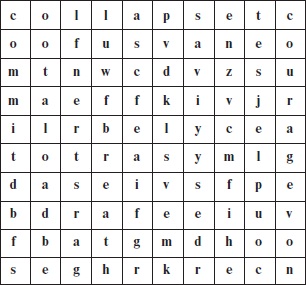 1. (с… ) совершать, 2. (с… ) падать, 3. (m… ) женатый, 4. (с… ) признание, 5. (с… ) пара, 6. (b… ) дыхание, 7. (с… ) мужество, 8. (1… ) удачливый, 9. (r… ) осознавать, 10. (1… ) грузить. 8. Render the joke. Section 10 Bride and groom 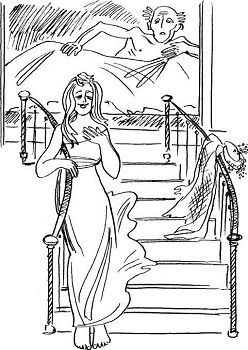 A small tourist hotel was all abuzz about an afternoon wedding where the groom was 95 and the bride was 23. The groom looked pretty feeble and the feeling was that the wedding night might kill him, because his bride was a healthy, vivacious young woman. But lo and behold, the next morning, the bride came down the main staircase slowly, step by step, hanging onto the bannister for dear life. She finally managed to get to the counter of the little shop in the hotel. The clerk looked really concerned, «Whatever happened to you, honey? You look like you've been wrestling an alligator!» The bride groaned, hung on to the counter and managed to speak, «Ohhh God! He told me he'd been saving up for 75 years and I thought he meant his money!!» Study the words and expressions given below: bride невеста feeble слабый, хилый healthy здоровый vivacious живой, веселый bannister перила concern озабоченность, беспокойство whatever что бы то ни было, что же to wrestle бороться, заниматься борьбой alligator аллигатор to groan стонать save up копить to mean иметь в виду to be all abuzz разг.to buzz жужжать, волноваться lo and behold уст. и вот! о чудо! step by step шаг за шагом, ступенька за ступенькой to hang onto (on to) sth висеть, виснуть на чем-л. for dear life (борясь) за жизнь из последних сил Exercises to the text1. Answer the questions to the text: 1. Why was the hotel all abuzz? 2. How old were the groom and the bride? 3. What did the groom look like? 4. In what manner did the bride come down the next morning? 5. What did the clerk at the counter ask the bride? 6. How long had the groom been saving up? 7. What had he been saving up? 2. Fill in the blanks with the words from the text: 1. The hotel was all abuzz _______ the wedding. 2. The groom looked _______ feeble. 3. The _______ was that the wedding night might kill him. 4. _______ next morning, the bride came down the main staircase. 5. She _______ managed to get to the counter. 6. The clerk looked _______ concerned. 7. You _______ like you've been wrestling an alligator. 3. Match the two parts of the sentences:  4. Match the words and expressions in the left column to those in the right one: 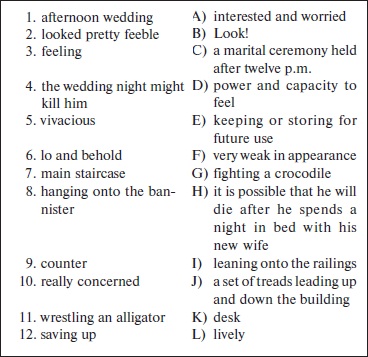 5. Translate from Russian into English: 1. Жених выглядел весьма хилым. 2. Брачная ночь могла убить его. 3. Но, о чудо! на следующее утро невеста медленно спустилась вниз, держась за перила. 4. Клерк выглядел действительно озабоченным. 5. Вы выглядите так, словно боролись с аллигатором. Revise English GrammarВ предложениях You look like you've been wrestling an alligator и He told me he'd been saving up for 75 years… используется форма совершенного длительного времени, имеющая весьма своеобразную сферу применения и отличающаяся от форм совершенного времени. Проверьте, насколько хорошо вы владеете этой формой, при необходимости обратившись к грамматическому комментарию (раздел 12). 6.Fill in the blanks with appropriate forms of the verbs: 1. A small tourist hotel (to wait) _______ for the newly married since early in the morning. 2. They (to come) _______ to the conclusion about their age only after a long discussion. 3. The bride (to prepare) _______ for the wedding night for about two hours, and when she was ready, the groom (already to fall) _______ asleep. 4. She (to wrestle) _______ with this alligator since midnight. 5. I've (to save up) _______ money in the bank for twenty five years, and I (already to save up) _______ about ten bucks. 7.Render the joke. Section 11 After the wedding night A young couple were married, and celebrated their first night together, doing what newlyweds do, time and time again, all night long. Morning comes and the groom goes into the bathroom but finds no towel when he emerges from the shower. He asks the bride to please bring one from the bedroom. When she gets to the bathroom door, he opened the door, exposing his body for the first time to his bride where she sees all of him well. Her eyes went up and down and at about midway they stopped and stared, and she asked shyly, «What's THAT?», pointing to a small part of his anatomy. He, also being shy, thought for a minute and then said, «Well, that's what we had so much fun with last night.» And she, in amazement, asked, «Is that all we have left?» Study the words and expressions given below: to celebrate праздновать newlyweds молодожены to expose выставлять, показывать midway на полпути shy застенчивый anatomy анатомия; зд. тело amazement изумление all night long всю ночь to ask sb to please do sth разг. попросить кого-л. сделать что-л. Exercises to the text1. Answer the questions to the text: 1. How did the young couple celebrate their first night together? 2. What couldn't the groom find when he emerged from the shower? 3. What did he ask his bride for? 4. Who and what did she see when she opened the door of the bathroom? 5. Do you think she could control the movement ofher eyes? 6. Judging by the way the bride reacted to her husband's appearance in the bath, could you guess where she had been brought up? 2. Fill in the blanks with the words from the text: 1. They _______ their first night together. 2. What do _______ all night long? 3. The groom goes into the bathroom but finds _______ there. 4. He asks the bride to _______ a towel. 5. He is _______ his body for the first time. 6. Her eyes went up and down and _______ midway they stopped. 7. She asked _______, «What's THAT?» 3. Say if the statements are true or false: 1. A young couple were married, and celebrated their first night together. 2. Morning comes and the groom goes into the bathroom but finds no bath there. 3. He asks the bride to please bring a towel from the bedroom. 4. He opened the door, exposing his body for the first time. 5. Her eyes went down, and down, and down. 6. Well, that's what we had so little fun with last night. 4. Match the words and expressions in the left column to those in the right one: 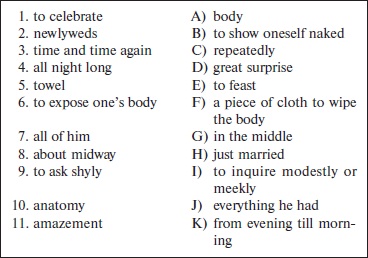 5. Translate from Russian into English: 1. Они занимались этим всю ночь напролет, снова и снова. 2. Он появился из душа, но не нашел полотенца. 3. Она отлично увидела его целиком. 4. Ее глаза скользнули вверх и вниз, и примерно на полпути они остановились. 5. Она спросила застенчиво. 6. Это все, что у нас осталось? Revise English GrammarВ предложениях Не said, «Well, that's what we had so much fun with last night» и And she asked, «Is that all we have left?» содержатся фрагменты прямой речи, которую при пересказе или иных формах передачи текста иногда приходится трансформировать в речь косвенную. Проверьте свои навыки преобразования прямой речи в косвенную, при необходимости обратитесь к грамматическому приложению (раздел 13). 6. Transform the Direct Speech into Indirect: 1. I asked her, «When were you married?» 2. He said, «We celebrated our first night together.» 3. «They are doing what newlyweds always do,» he whispered. 4. «I will go into the bathroom,» said the groom. 5. «Please, bring a towel from the bedroom,» he asked her. 6. «Where are you?» she asked. 7. «Why are you staring at me in such a way?» he asked. 8. «Well, that is what we had so much fun with last night,» he answered. 9. And she asked in despair, «Is that all we have left?» 7.Put the verbs into proper forms: 1. When the young couple were getting married, they (to decide) _______ they (to celebrate) _______ their first night together. 2. He said that he (to go) _______ to the bathroom in the morning. 3. Morning came and the groom (to go) _______ into the bathroom but (to find) _______ no towel there. 4. When she got to the bathroom door, he (already to open) _______ it from inside. 5. She said that was all that they (to leave) _______. 8.Render the joke. Section 12 The groom's childhood diseases Two newlyweds went on their honeymoon and were getting undressed together for the first time. He took off his shoes and socks and his toes were all twisted and discolored. «What happened to your feet?» his wife asked. «I had a childhood disease called tolio.» «Don't you mean polio?» «No, tolio, it only affects the toes.» He then removed his pants and revealed an awful looking pair of knees. «What happened to your knees?» she asked. «Well, I also had kneesles.» «Don't you mean measles?» «No, kneesles, it only affects the knees.» When he removed his shorts his wife gasped and said, «Don't tell me, you also had smallcox!» Study the words and expressions given below: toe палец ноги to twist скручивать to discolor обесцвечивать disease болезнь polio разг. полиомиелит to affect влиять t o remove зд. снимать to reveal открывать awful ужасный knee колено measles корь shorts трусы, шорты to gasp задыхаться, открывать рот от изумления smallpox оспа smallcox результат игры слов, наложения семантики слова smallpox на просматривающееся через контекст слово cock, которое в силу этого приобретает оттенки значения «маленький» to get undressed раздеться awful looking разг. awfully looking выглядящий ужасно Exercises to the text1. Answer the questions to the text: 1. What were the newlyweds doing for the first time? 2. What did the groom's toes look like? 3. How did he explain the condition of his feet? 4. What was wrong with his knees and how did he account for this fact? 5. When he removed his shorts, what disease did his wife suspect he might have had? 2. Fill in the blanks with the words from the text: 1. Two newlyweds _______ their honeymoon. 2. His toes were _______ twisted and discolored. 3. What _______ to your feet? 4. I had a _______ disease called tolio. 5. It only _______ the toes. 6. He _______ his pants and _______ a pair of knees. 3. Match the two parts of the sentences: 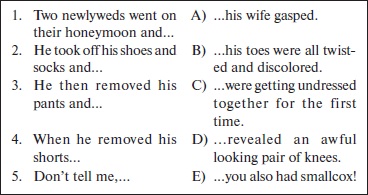 4. Match the words and expressions in the left column to those in the right one: 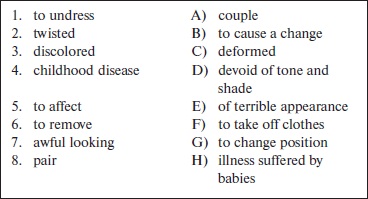 5. Translate from Russian into English: 1. Он снял ботинки и носки. 2. Что случилось с пальцами твоих ног? 3. У меня была детская болезнь – корь. 4. Он обнажил ужасно выглядящую пару коленок. 5. Она оказывает воздействие только на колени. 6. Его жена открыла рот от удивления и сказала: «Не говори мне, что у тебя еще была и оспа». Revise English GrammarВ предложении His toes were all twisted and discolored… используются глаголы в форме пассивного залога. Проверьте свое знание данной формы, при необходимости справляясь в грамматическом комментарии (раздел 14). 6. Put the verbs in brackets into Passive: 1. Two newlyweds (to invite) _______ to their friend's house to spend the honeymoon there last year. 2. Just you wait! The shoes (to take off) _______ in a moment. 3. The socks (to dry) _______ at present. 4. My toes (to twist) _______ because of the disease I had in childhood. 5. At last the pants (to remove) _______. 6. His knees definitely (to affect) _______ by polio. 7.Transform the Direct Speech into Indirect: 1. His wife asked, «What happened to your feet?» 2. He said to her, «I had a childhood disease called tolio.» 3. She said, «Do you mean polio?» 4. She asked, «What happened to your knees?» 5. He said, «I also had kneesles.» 6. She said, «Are you having anything now?» 7. He said, «It only affects the knees.» 8. She asked, «Don't tell me, you also had smallcox!» 8. Find English equivalents to the Russian words in the scanword: 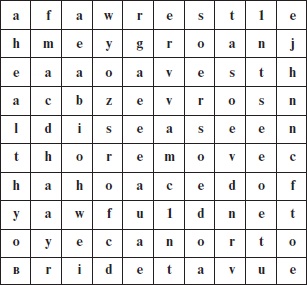 1. (t…) палец ноги, 2. (d…) болезнь, 3. (r…) снимать, удалять, 4. (r… ) открывать, 5. (а… ) изумление, 6. (h… ) здоровый, 7. (w… ) бороться, 8. (g… ) стонать, 9. (b… ) невеста, 10. (а…) ужасный. 9. Render the joke. Section 13 A couple at the zoo 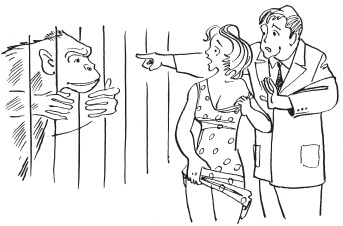 It's a beautiful warm spring day and a man and his wife are visiting the local zoo. She's wearing a cute, loose-fitting, pink spring dress, sleeveless, with straps. As they walk through the ape exhibit and pass in front of a very large gorilla, the gorilla begins to go ape. He jumps up on the bars, holding on with one hand (and two feet), grunts, and pounds his chest with his free hand. The gorilla is obviously excited at seeing the pretty lady in the pink dress. The husband, noticing the excitement, suggests that his wife tease the poor fellow by puckering her lips, wiggling her bottom… play along. She does, and Mr Gorilla gets even more excited, making noises that would wake the dead. Then the husband suggests that she let one of her straps fall. She does, and Mr Gorilla is just about to tear the bars down! The husband then suggests that she try lifting her dress up her thighs. This drives the poor gorilla absolutely crazy. Then quickly the husband grabs his wife, rips open the door to the cage, flings her in with the gorilla and says, «Now tell HIM you have a headache.» Study the words and expressions given below: to wear носить (одежду) cute милый, славный loose свободный to fit подходить по размеру (об одежде) loose-fitting свободного покроя pink розовый sleeveless без рукавов strap тесьма, лямка аре обезьяна exhibit выставка, экспозиция аре exhibit обезьянник gorilla горилла bars решетка to grunt ворчать, сердиться to pound колотить chest грудь; грудная клетка obviously очевидно to notice замечать excitement возбуждение to suggest предлагать to tease дразнить poor бедный fellow парень to pucker морщить (губы), складывать (губы) в гримаску to lift поднимать thigh бедро to drive двигать, понуждать crazy сумасшедший, чокнутый to grab хватать, захватывать to rip рвать; раскрывать to fling толкать, бросать to wiggle one's bottom крутить задом to go ape обезьянничать to play along играть до конца to wake the dead разбудить мертвого to tear the bars down сносить решетку to drive sb crazy сводить кого-л. с ума Exercises to the text1. Answer the questions to the text: 1. What sort of a dress was the wife wearing? 2. How did the gorilla start to behave when the couple was passing its cage? 3. What was the ape excited by? 4. What did the husband suggest that his wife do when he noticed the gorilla's excitement? 5. What did the husband suggest she do with the straps of her dress? 6. What drove the poor gorilla absolutely crazy? 7. Do you think the wife had really had many headaches? 2. Fill in the blanks with the words from the text: 1. A man and his wife are visiting the _______ zoo. 2. She's wearing a cute, _______ dress. 3. They walk through the _______ exhibit. 4. The gorilla is _______ excited at seeing the lady. 5. The man suggests that his wife _______ the poor fellow. 6. Then the husband suggests that she _______ one of her straps fall. 7. This drives the gorilla absolutely _______. 3. Say if the statements are true or false: 1. As they pass in front of a very large gorilla, the gorilla falls asleep. 2. The gorilla is obviously excited at seeing the pretty lady in the pink dress. 3. The husband, noticing the excitement, suggests that his wife tease the poor fellow. 4. Mr. Gorilla gets even more excited, making noises that would kill the alive. 5. This drives the poor gorilla away. 6. The husband grabs the gorilla, rips open the door to the cage, and flings her in with the wife. 4. Match the words and expressions in the left column to those in the right one: 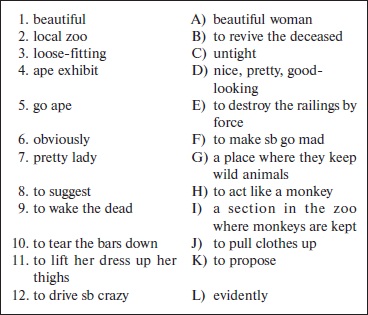 5. Translate from Russian into English: 1. На ней красивое, свободного покроя платье без рукавов, на лямках. 2. Горилла начинает обезьянничать. 3. Горилла явно возбуждена при виде дамы в розовом платье. 4. Муж предлагает жене подразнить бедного парня. 5. Он производит шум, который разбудил бы и мертвого. 6. Горилла готова снести решетки. 7. Он быстро хватает ее и толкает в клетку. Revise English GrammarВ сложных предложениях с союзом that (The husband suggests that his wife tease the poor fellow…, Then the husband suggests that she let one of her straps fall… и The husband then suggests that she try lifting her dress up her thighs…) мы сталкиваемся с одним из так называемых глаголов «побуждения к действию», использование которых подчиняется особому правилу. Проверьте, насколько хорошо вы знаете правило использования этих глаголов. В случае необходимости обратитесь к грамматическому комментарию (раздел 15). 6. Fill in the blanks with appropriate forms of the verbs: 1. The man insisted that his wife (to wear) _______ a cute, loose-fitting dress. 2. It is imperative that we (to walk) _______ through the ape exhibit. 3. The husband proposed that his wife (to tease) _______ the poor fellow. 4. Then the husband urged her wife (to let) _______ one of her straps fall. 5. It is necessary (to tear) _______ the bars down. 6. It is important that you (to lift) _______ your dress up your thighs. 7. It was a recommendation that you (to grab) _______ your wife and (to fling) _______ her into the cage. Revise English GrammarВ предложении Then the husband suggests that she let one of her straps fall используется форма так называемого сложного дополнения She let the straps fall. Проверьте, насколько хорошо вы владеете этой синтаксической формой, при необходимости прибегая к грамматическому комментарию (раздел 16). 7. Fill in the blanks with appropriate forms of the verbs: 1. I want you (to visit) _______ the local zoo. 2. I expect you (to wear) _______ this cute dress. 3. Don't make him (to go) _______ ape. 4. I saw him (to jump) _______ up on the bars. 5. They heard the gorilla (to grunt) _______ and pound his chest with his free hand. 6. I watched her (to wiggle) _______ her bottom. 7. The husband noticed the ape (to be excited) _______, and wanted his wife (to tease) _______ the poor fellow even more. 8.Transform the sentences into Passive: 1. A man and his wife are visiting the local zoo. 2. He pounds his chest with his free hand. 3. The pretty lady in the pink dress obviously excited the gorilla. 4. The noises would wake the dead. 5. Gorilla is tearing the bars down. 6. She has lifted her dress up her thighs. 7. This drives the poor gorilla absolutely crazy. 8. The husband grabs his wife and flings her in with the gorilla. 9.Render the joke. Section 14 Before you get married «Honey,» said a husband to his wife, «I invited a friend home for supper.» «What? Are you crazy? The house is a mess, I didn't go shopping, all the dishes are dirty, and I don't feel like cooking a fancy meal!» «I know all that.» «Then why did you invite a friend for supper?» «Because the poor fool is thinking about getting married.» Study the words and expressions given below: a mess беспорядок, состояние беспорядка fancy фантазия, воображение meal еда, прием пищи a fancy meal праздничный обед fool дурак I don't feel like cooking я не в настроении готовить еду Exercises to the text1. Answer the questions to the text: 1. Who did the husbund invite for supper? 2. What does the wife think about their house? 3. What meal is she supposed to cook for her husband's friend? 4. What will happen when the friend comes to their home? 2. Fill in the blanks with the words from the text: 1. A husband said _______ his wife, «I invited a friend home for supper.» 2. Are you _______? 3. The house is a _______. 4. All the dishes are _______. 5. I don't feel like _______ a fancy meal. 6. Why did you invite a friend _______ supper? 7. The poor fool is thinking about _______ married. 3. Match the two parts of the sentences: 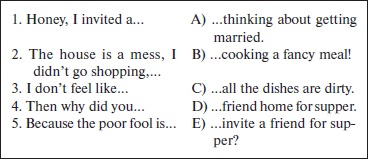 4. Match the words and expressions in the left column to those in the right one: 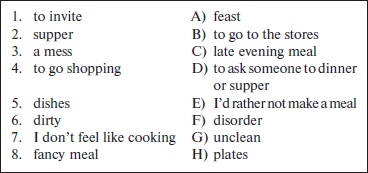 5. Translate from Russian into English: 1. Я пригласил друга домой на ужин. 2. Ты сошел с ума? 3. Я не ходила в магазин. 4. Мне не хочется готовить праздничный стол. 5. Бедный дурак думает о том, чтобы жениться. Revise English GrammarВ предложениях I didn't go shopping… I don't feel like cooking… The poor fool is thinking about getting married… используется так называемая –ing-овая форма английского глагола, которая в зависимости от места в предложении является либо причастием (причастием 1), либо герундием и, соответственно, подчиняется разным правилам употребления. Проверьте свои знания этих форм, при необходимости справляясь в грамматическом комментарии (раздел 17). 6.Translate from Russian into English using the words in brackets: 1. Вместо того (Instead of, to go to the restaurant) чтобы пойти с другом в ресторан, он пригласил его домой на ужин. 2. Она разговаривает сейчас с мужем. 3. По прибытии (On, to come) домой он пошел в магазин (to go, shop). 4. Я обожаю (to be fond of, to wash dishes) мыть посуду. 5. Он закончил работать (to finish, to work) после шести часов. 6. Он прекратил есть (to stop, to eat) и посмотрел на часы. 7. Мы едим салат. 8. Я обожаю ходить в магазин (to be fond of, shop). 9. Человек, курящий сигарету, мой друг. 7. Render the joke. Section 15 Coming home late at night A guy is real drunk and gets home real late. Trying to avoid the little woman, he parks a block away from his home. He takes off his shoes as he walks up the stairs, careful not to make a noise. He quietly opens the door and tiptoes into the room, when «BAM!!!» – he gets hit by a frying pan… Telling the story to a friend the next day at the local watering hole, his best friend sadly shakes his head and says, «Boy, you are inert! Now here's how I do it. When I get drunk I go borrow my bud's Harley and go screamin' up and down my block a couple of times a hootin' and a hollerin'. I take the Harley rat up on the porch and then start screamin' and a cuss-in'. I slam open the door and scream, 'Tim the man of the house and I want some sex rat now!» And you know what's amazin'??? My wife is always asleep!!!" Study the words and expressions given below: to avoid избегать to park парковать (машину) block квартал домов to tiptoe от tip(кончик) и toe(палец ноги) идти на цыпочках to fry жарить pan кастрюля frying pan сковорода hole дыра sad печальный inert вялый, зд. неизобретательный to borrow брать взаймы bud приятель Harley мотоцикл «Харлей-Дэвидсон» screamin' разг. screaming вопя, крича a hootin' разг. hooting свистя a hollerin' разг. howling завывая rat paзг. right прямо porch крыльцо a cussin' разг. cursing ругаясь to slam хлопать (дверью); с грохотом открывать (дверь) amazin' paзг. amazing удивительный; удивительно a block away за квартал (от дома) to get hit получать удар local watering hole местная забегаловка (досл. местная дыра, где можно промочить горло) to shake one's head качать головой to get drunk напиваться пьяным a couple of times пару раз slam open the door с грохотом открывать дверь Exercises to the text1.Answer the questions to the text: 1. When did the guy get home? 2. Why did he park a block away from home? 3. What did he do not to make a noise on the stairs? 4. What did he get hit by? 5. Who did he tell this story the next day? 6. What were they doing in the watering hole? 7. Who does his friend borrow a Harley from? 8. In what way does he drive the Harley? 9. Where does he take the bike? 10. What does he scream when he enteres the door? 11. Why is his wife always asleep? 2.Fill in the blanks with the words from the text: 1. Trying to _______ the little woman, he parks a block away. 2. He takes off his shoes, _______ not to make a noise. 3. He quietly opens the door and _______ into the room. 4. He gets hit by a _______ pan. 5. He tells the story to a friend at the local _______ hole. 6. His best friend _______ shakes his head. 7. I go _______ my bud's Harley. 8. I take the Harley rat up on the _______. 3. Say if the statements are true or false: 1. A guy is real drunk and gets home real late. 2. Trying to avoid the little woman, he parks quite near his home. 3. He quietly opens the door and tiptoes into the room. 4. When I get drunk I go borrow my bud's F-16 and go screamin' up and down my block a couple of times. 5. I take the Harley rat up on the porch. 6. I slam open the door and scream, «I'm the man of the house.» 7. My wife is always away. 4. Match the words and expressions in the left column to those in the right one: 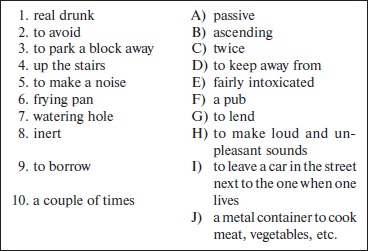 5. Translate from Russian into English: 1. Он снимает свои ботинки, когда идет по лестнице. 2. Он тихо открывает дверь и идет на цыпочках в комнату. 3. Он получает удар сковородой. 4. Его лучший друг печально качает головой. 5. Так вот как это делаю я. 6. Я гоню Харлея прямо на крыльцо. 7. Я с грохотом открываю дверь и кричу. 8. Моя жена всегда спит. Revise English GrammarГрамотная английская речь, как и речь русская, подчиняется огромному количеству правил, в том числе и правил стилистических. Избегая нарушения этих правил, мы говорим правильно. Вместе с тем в разговорной речи встречается огромное количество нарушений стилистической нормы. Так, следующие предложения содержат одну и ту же конструкцию – причастный оборот, относящийся к подлежащему. Но в первом случае этот оборот использован правильно, во втором – с нарушениями. 1. Trying to avoid the little woman, he parks a block away from his home… 2. Telling the story to a friend the next day at the local watering hole, his best friend sadly shakes his head… Найдите, в чем состоит нарушение правила (при затруднениях обратитесь к грамматическому комментарию; раздел 18). 6. Transform the sentenses according to the rules when necessary: 1. Having got drunk, the guy came home real late. 2. Trying to avoid the little woman, his car is left a block away from his home. 3. Walking up the stairs, he tries his best not to make a noise. 4. Opening quietly the door and tiptoeing into the room, his wife hits him by a frying pan. 5. Telling the story to a friend the next day at the local watering hole, his best friend sadly shakes his head. 6. Taking the Harley rat up on the porch, I start screamin' and a cussin'. 7. Slamming open the door and screamin', his wife is always asleep. 7. Find English equivalents to the Russian words in the scanword: 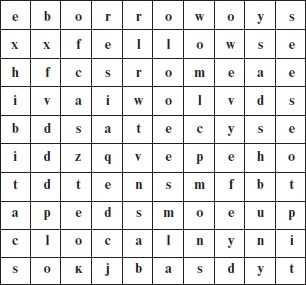 1. (а…) избегать, 2. (t…) идти на цыпочках, 3. (b…) брать взаймы, 4. (1… ) местный, 5. (m… ) беспорядок, 6. (е… ) выставка, 7. (е… ) возбуждение, 8. (f… ) парень, 9. (а… ) обезьяна, 10. (s… ) без рукавов. 8. Render the joke. Section 16 Control of your wife 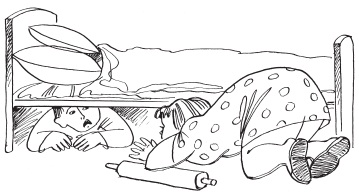 There were three guys talking in the pub. Two of them were talking about the amount of control they had over their wives, while the third remained quiet. After a while one of the first two turned to the third and said, «Well, what about you? What sort of control do you have over your wife?» The third fellow says, «I'll tell you. Just the other night my wife came to me on her hands and knees.» The first two guys were amazed. «Wow! What happened then?» they asked. The third man took a healthy swallow of his beer, sighed and uttered, "She said, 'Get out from under the bed and fight like a man!' " Study the words and expressions given below: control контроль, власть pub паб, пивная amount объем, величина to remain оставаться swallow глоток (пива, воды, вина) healthy swallow большой глоток beer пиво to sigh вздыхать to utter произносить to fight сражаться, драться Get out! Убирайся! Вылезай! after a while через некоторое время what sort of? какого типа? какого вида? the other night на днях вечером Exercises to the text1. Answer the questions to the text: 1. How many guys were there in the pub? 2. What did they drink there? 3. What were two of them talking about? 4. What question was the third guy asked? 5. In what way had the third guy's wife come to him one of the nights? 6. What did she say to her husband? 2. Fill in the blanks with the words from the text: 1. Two of the guys are talking about the _______ of control they had over their wives. 2. The third guy _______ quiet. 3. After a _______ one of the first two guys turned to the third one. 4. What _______ of control do you have over your wife? 5. Just the _______ night my wife came to me. 6. The first two guys were _______ . 7. The third man took a healthy _______ of his beer. 3. Match the two parts of the sentences: 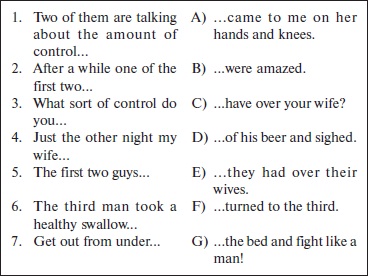 4. Match the words and expressions in the left column to those in the right one: 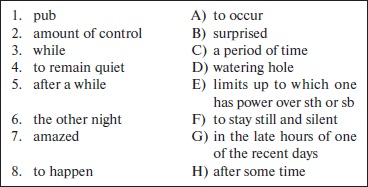 2. Какого размера власть ты имеешь над своей женой? 3. Третий парень хранил молчание. 4. Через некоторое время один из первых двоих повернулся к третьему. 5. Ну, а как насчет тебя? 6. Как раз на днях вечером моя жена приползла ко мне на четвереньках. 7. Что случилось потом? Revise English Grammar«Get out from under the bed!» — приказала жена третьему из парней, сидящих в баре. Слово get может использоваться и в других словосочетаниях, проявляя поразительную многозначность. Проверьте свое языковое чутье в отношении этого слова. При необходимости используйте грамматический комментарий (раздел 19). 6.Read the text one more time and substitute the word «to get» for any verb that seems to have about the same meaning. 7.Render the joke. Section 17 Prospective church members Three couples, an elderly couple, a middle-aged couple and a young newlywed couple wanted to join a church. The pastor said, «We have special requirements for new parishioners. You must abstain from having sex for two weeks.» The couples agreed and came back at the end of two weeks. The pastor went to the elderly couple and asked, «Were you able to abstain from sex for the two weeks?» The old man replied, «No problem at all, Pastor.» «Congratulations! Welcome to the church!» said the pastor. The pastor went to the middle-aged couple and asked, «Well, were you able to abstain from sex for the two weeks?» The man replied, «The first week was not too bad. The second week I had to sleep on the couch for a couple of nights but… yes we made it.» «Congratulations! Welcome to the church!» said the pastor. The pastor then went to the newlywed couple and asked, «Well, were you able to abstain from sex for the two weeks?» «No, Pastor, we were not able to go without sex for the two weeks,» the young man replied sadly. «What happened?» inquired the pastor. «My wife was reaching for a can of corn on the top shelf and dropped it. When she bent over to pick it up, I was overcome with lust and took advantage of her right there.» «You understand, of course, this means you will not be welcome in our church,» stated the pastor. «We know,» said the young man, «we're not welcome at the local supermarket anymore either.» Study the words and expressions given below: elderly пожилой, стареющий to join вступить (куда-л.), присоединиться pastor священник, пастор requirements требования (от to requireтребовать) parishioner прихожанин (от parishприход) to abstain воздерживаться to reply отвечать couch кушетка to reach (for) дотягиваться (до чего-л.) can банка corn кукуруза top верх; верхний to bend (over) наклоняться (над чем-л.) lust сильное желание advantage преимущество to state утверждать to join a church вступить в церковь to be able быть способным, мочь No problem at all! Никаких проблем! to go without sex обходиться без секса Congratulations! Поздравления! Welcome! Добро пожаловать! to be welcome быть желаемым, желанным (где-л.) to pick sth up поднимать что-л. to be overcome with sth быть охваченным (чем-л.) to take advantage of her воспользоваться удобным моментом right there прямо там Exercises to the text1. Answer the questions to the text: 1. How many couples wanted to join the church and how old were they? 2. What special requirements did the couples have to meet if they wanted to join the church? 3. Who did the pastor go to first when the couples returned after the two weeks' trial period? 4. Why was it easy for an elderly couple to be admitted to church? 5. How did the middle-aged husband cope with the problem? 6. What was wrong with the can of corn? 2. Fill in the blanks with the words from the text: 1. Two couples wanted _______ a church. 2. We have special _______ for new parishioners. 3. You must _______ from having sex. 4. No problem _______, Pastor. 5. _______ to the church! 6. I had to sleep on the couch for _______ of nights. 7. We were not _______ to go without sex. 8. My wife was _______ for a can of corn. 3. Say if the sentences are true or false: 1. Three couples, an elderly couple, a middle-aged couple and a young newlywed couple wanted to join the army. 2. We have special requirements for new parishioners. 3. You must abstain from having sex for two weeks. 4. The couples didn't agree and never came back. 5. The second week I had to sleep on the couch for a couple of nights. 6. I was reaching for a can of corn on the top shelf and dropped it. 7. We're not welcome at the local zoo anymore either. 4. Match the words and expressions in the left column to those in the right one: 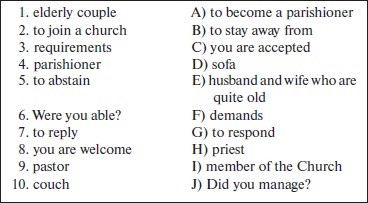 5. Translate from Russian into English: 1. Три пары захотели вступить в церковь. 2. Мы предъявляем особые требования к нашим прихожанам. 3. Пары согласились и пришли назад через две недели. 4. Никаких проблем, пастор! 5. Поздравления! Добро пожаловать в церковь! 6. Первая неделя была не слишком тяжкой. 7. Я был вынужден спать на кушетке пару ночей. 8. Я был охвачен сильным желанием и воспользовался своим преимуществом над ней прямо там. 9. Нас также не хотят больше видеть и в местном супермаркете. Revise English GrammarВ предложениях You must abstain from having sex for two weeks; Were you able to abstain from sexfor the two weeks? I had to sleep on the couch for a couple of nights but… используются так называемые модальные глаголы и их заменители (must, to be able, to have to). Проверьте свои знания модальных глаголов; при необходимости используйте грамматический комментарий (раздел 20). 6.Translate from Russian into English using modal verbs and their substitutes: 1. Вы можете вступить в церковь. 2. Вы сможете вступить в церковь, если выполните особые требования. 3. Вы должны воздерживаться от секса в течение трех недель. 4. Мы не можем сделать этого. 5. Мы должны были прийти через три недели. 6. Мы не смогли сделать этого. 7. Я вынужден был спать на кушетке. 8. Мне не было необходимости спать на кушетке. 9. Можно мне вступить в вашу церковь без испытательного срока? 10. Мне позволили сделать это без испытательного срока. 11. Вам не следовало бы больше ходить в местный супермаркет. 7.Fill in the blanks with proper forms of the verbs: 1. It's a recommendation that you (to join) _______ a church. 2. It's necessary that we (to have) _______ special requirements for new parishioners. 3. He suggested that we (to abstain) _______ from having sex for two weeks. 4. He urged them (to come) _______ back at the end of two weeks. 5. He found it necessary (to sleep) _______ on the couch for a couple of nights. 8.Fill in the blanks with proper forms of the verbs: 1. I want you (to join) _______ a church. 2. He expected them (to abstain) _______ from having sex for two weeks. 3. The pastor saw the elderly couple (to enter) _______ the church. 4. He let them (to pass over) _______ to the altar. 5. This made him (to sleep) _______ on the couch for a couple of nights. 6. He watched the wife (to try) _______ to reach for a can of corn. 7. He saw her (to pick) _______ the can up. 8. This made him (to take) _______ advantage of her right there. 9. Render the joke. Section 18 An elderly couple An elderly couple had been dating for some time and decided it was finally time to marry. Before the wedding they embarked on a long conversation regarding how their marriage might work. They discussed finances, living arrangements and so on. Finally the old man decided it was time to broach the subject of their connubial relationship. «How do you feel about sex?» he asked, rather hopefully. «Oh, I like to have it infrequently,» she responded. The old guy thought for a moment, then asked, «Was that one word or two?» Study the words and expressions given below: to decide решать to embark пускаться (в плавание, в разговор и т.д.) regarding относительно, касательно (от to regard считать) finances финансы, финансовое состояние arrangement организация (от to arrange устраивать, организовывать, оформлять) to broach починать, открывать subject предмет, вопрос connubial супружеский, брачный relationship отношение hopefully с надеждой infrequently нечасто (от frequently часто) to respond отвечать it was time to do sth время (пора) делать что-л. living arrangements условия жизни and so on и так далее broach the subject поднимать вопрос Exercises to the text1. Answer the questions to the text: 1. When did the elderly couple decide it was time for them to marry? 2. What sort of conversation did they embark on before the wedding? 3. What did they discuss? 4. What subject did the old man decide to raise in the end? 5. How often would his partner like to make love? 6. Taking into account the old guy's age, would he prefer «in-» to stand for a prefix or for a preposition? 2. Fill in the blanks with the words from the text: 1. An elderly couple had been _______ for some time. 2. Before the wedding they _______ on a long conversation. 3. They discussed _______, living arrangements and so on. 4. Finally the old man decided _______ the subject of sex. 5. Oh, I like to have it _______ . 6. Was that _______ word or two? 3. Say if the statements are true or false: 1. An elderly couple had been living together for some time, and decided it was finally time to divorce. 2. Before the wedding they embarked on a long conversation regarding how their marriage might work. 3. They discussed government policy and finances. 4. Finally the old lady decided it was time to broach the subject of their connubial relationship. 5. Oh, I like to have it in frequently. 6. The old guy thought for a moment, then asked, «Was that one word or two?» 4. Match the words and expressions in the left column to those in the right one: 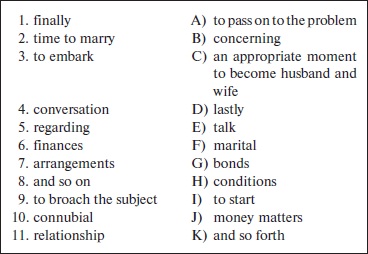 5. Translate from Russian into English: 1. Пожилая пара решила, что им пора пожениться. 2. Перед свадьбой они говорили о том, как они могли бы жить вместе. 3. Наконец он решил заговорить об их брачных отношениях. 4. О, я люблю это изредка. 5. Это было одно слово или два? Revise English GrammarПрактически в каждом английском предложении активную роль в согласовании его членов играют предлоги и предложные конструкции. Проверьте свои знания английских предлогов и предложных конструкций (при необходимости см. грамматический комментарий; раздел 21). 6. Insert prepositions where necessary: 1. An elderly couple had been dating _______ some time. 2. They had been meeting _______ May _______ December. 3. Before the wedding they met _______ the restaurant, and _______ dinner they embarked _______ a long conversation. 4. They spoke _______ their living arrangements and the way they would spend their honeymoon. 5. She wanted to go _______ Naples, while he insisted staying _______ the USA. 6. He took the bottle _______ champagne which stood him _______ the dinner table and poured some wine _______ her glass. 7. The old man decided to discuss the subject _______ their connubial relations. 8. She flung the wine _______ his face saying, «What do you take me?» 7. Translate from Russian into English using modal verbs: 1. Нам нет необходимости больше встречаться. 2. Мы можем пожениться. 3. Мы должны обсудить то, как будет устроена наша семейная жизнь. 4. Должны мы обсуждать финансы? 5. Можно мне приступить к вопросу о наших брачных отношениях? 6. Я вынужден спросить тебя, могу ли я обсудить и этот пункт. 7. Будет ли мне позволено делать это часто? 8. Я не смог понять, что она имела в виду. 8. Insert articles where necessary: 1. They had been dating for some _______ time and decided it was finally time to marry. 2. Before _______ wedding they embarked on _______ long conversation. 3. They discussed how their _______ marriage might work. 4. They discussed _______ finances. 5. Finally _______ old man decided to broach _______ subject of their connubial relationship. 6. How do you feel about _______ sex? 9. Find English equivalents to the Russian words in the scanword: 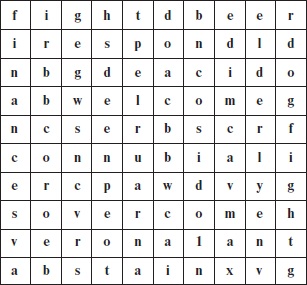 1. (f…) финансы, 2. (с…) брачный, 3. (r…) отвечать, 4. (е… ) пожилая, 5. (а… ) воздерживаться, 6. (w… ) добро пожаловать, 7. (о… ) охваченный, 8. (р… ) пивная, 9. (b… ) пиво, 10. (f… ) драться. 10. Render the joke. Section 19 Two additions to the periodic table of elements * Element Name: WOMANIUM * Symbol: WO * Atomic Weight: (don't even go there) * Physical properties: Generally soft and round in form. Boils at nothing and may freeze any time. Melts when treated properly. Very bitter if not used well. * Chemical properties: Very active. Highly unstable. Possesses strong affinity with gold, silver, platinum, and precious stones. Violent when left alone. Able to absorb great amounts of exotic food. Turns slightly green when placed next to a better specimen. * Usage: Highly ornamental. An extremely good catalyst for dispersion of wealth. Probably the most powerful income reducing agent known. * Caution: Highly explosive in inexperienced hands! * Element Name: MANIUM * Symbol: XY * Atomic Weight: (180 +/– 50) * Physical properties: Solid at room temperature, but gets bent out of shape easily. Fairly dense and sometimes flaky. Difficult to find a pure sample. Due to rust, aging samples are unable to conduct electricity as easily as young samples. * Chemical properties: Attempts to bond with WO (WOMANIUM) any chance it can get. Also tends to form strong bonds with itself. Becomes explosive when mixed with KD (Element: CHILDIUM) for prolonged period of time. * Neutralize by saturating with alcohol. * Usage: None known. Possibly good methane source. Good samples are able to produce large quantities on command. * Caution: In the absence of WO (WOMANIUM), this element rapidly decomposes and begins to smell. Study the words and expressions given below: element элемент symbol символ atomic атомный weight вес physical физический property свойство, качество, состояние generally в общем, главным образом soft мягкий round круглый to boil кипеть to freeze замерзать to melt таять to treat обходиться (с кем-л.) properly правильно bitter горький; колкий to use использовать chemical химический active активный highly в высшей степени unstable нестабильный to possess владеть чем-л., иметь в своем распоряжении affinity хим. связь gold золото silver серебро platinum платина precious ценный, драгоценный violent свирепый, жестокий alone одинокий; в одиночестве to absorb абсорбировать, поглощать exotic экзотический to turn поворачиваться, становиться slight легкий, небольшой to place помещать, размещать specimen образец, экземпляр usage использование ornamental декоративный extremely в высшей степени catalyst катализатор dispersion дисперсия, растворение wealth богатство, состояние probably вероятно, возможно powerful сильный, мощный income доход to reduce сокращать agent агент, вещество caution осторожность explosive взрывчатое вещество; взрывоопасный inexperienced неопытный solid твердый temperature температура fairly достаточно хорошо dense густой, непроницаемый; тупой flaky хлопковидный; сленг пьяный pure чистый sample образец due to благодаря (чему-л.) rust ржавчина aging старение to conduct зд. проводить (электричество) electricity электричество to attempt предпринимать, пытаться to bond соединять, связывать to tend иметь стремление, иметь настроение to mix смешиваться to prolong продлевать neutralize нейтрализовать saturate хим. насыщать alcohol алкоголь possible возможный, вероятный methane метан source источник to produce производить quantity количество absence отсутствие rapid быстрый to decompose разлагаться, разваливаться don't even go there даже не ходи туда in form по форме any time в любое время next to рядом, по соседству to get bent сгибаться as… as так же, как any chance it can get при первом удобном случае on command по команде Exercises to the text1.Answer the questions to the text: 1. What's the atomic weight of Womanium? 2. What form does it possess? 3. How can one make it melt? 4. What happens to Womanium if it is not treated properly? 5. What does Womanium have strong affinity with? 6. How does it change its color when placed near a better specimen? 7. What can Womanium be used for? 8. Why is it so explosive if put into inexperienced hands? 9. What's the Manium's maximum atomic weight? 10. What's the difference between old and young samples of Manium in terms of conductivity? 11. How often can Manium form strong bonds with Woma-nium? 12. How can one make Manium explosive? 13. How can it be neutralized? 14. What's the best way to use Manium? 15. What happens to Manium in the absence of Womanium? 2.Fill in the blanks with the words from the text: 1. Generall _______ yand round. 2. Melts when _______ properly. 3. Violent when _______ alone. 4. Able to absorb great _______ of exotic food. 5. Turns slightly green when _______ next to a better specimen. 6. Probably the most powerful incomeagent _______ agent known. 7. Highly explosive in _______ hands! 3. Match the two parts of the sentences: 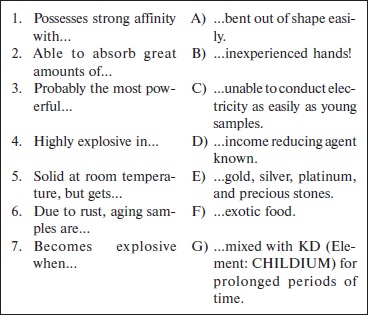 4. Match the words and expressions in the left column to those in the right one: 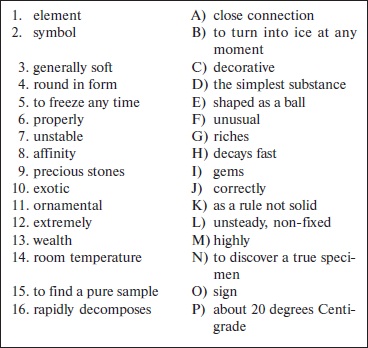 5. Translate from Russian into English: 1. Твердый при комнатной температуре, но легко меняет форму при сгибании. 2. Трудно найти чистый экземпляр. 3. Стареющие образцы неспособны проводить электричество. 4. Стремится установить сильные связи с самим собой. 5. Нейтрализуйте путем насыщения алкоголем. 6. Хорошие образцы способны производить большое количество по команде. 7. Этот элемент быстро разлагается и начинает пахнуть. Revise English GrammarВ предложениях Melts when treated properly… Very bitter if not used well… Turns slightly green when placed next to a better specimen… и других используется причастие II (причастие прошедшего времени, так называемая третья форма глагола); в предложениях Probably the most powerful income reducing agent known… Aging samples are unable to conduct electricity… используется причастие I (причастие настоящего времени, так называемая ing-овая форма глагола). Проверьте, насколько хорошо вы владеете этими формами причастия. При необходимости справляйтесь в разделе 22 грамматического комментария. 6. Fill in the blanks with either Participle I or Participle II: 1. Womanium is (to boil) _______ at room temperature. 2. It melts if (to treat) _______ properly. 3. Be careful while (to use) _______ Womanium. 4. (To absorb) _______ great amounts of food, Womanium tends to put on much weight. 5. The element (to turn) _______ slightly green, is Womanium. 6. Wonanium has (to disperse) _______ much of my wealth. 7. Probably it's the most powerful income (to reduce) _______ agent known. 8. Manium gets (to bend) _______ out of shape easily. 9. Manium (to form) _______ strong bonds with Womanium, never decomposes too soon. 7. Render the joke. Section 20 Unselfish generosity 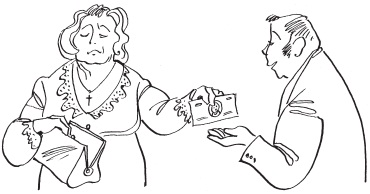 A woman was chatting with her next-door neighbor. «I feel really good today. I started out this morning with an act of unselfish generosity. I gave a five dollar bill to a bum.» «You gave a bum five whole dollars? That's a lot of money to just give away. What did your husband say about it?» "Oh, he thought it was the proper thing to do. He said, 'Thanks.' " Study the words and expressions given below: to chat болтать act акт; поступок unselfish бескорыстный, неэгоистичный generosity щедрость bill банкнот bum бродяга next-door живущий по соседству to start out начинать five whole dollars разг. целых пять долларов Exercises to the text1. Answer the questions to the text: 1. Who was the woman chatting with? 2. Why did she feel so good that day? 3. What sort of act did she commit? 4. How much did she give to a bum? 5. What did the neighbor think about this act of generosity? 2. Fill in the blanks with the words from the text: 1. A woman was chatting with her _______ neighbor. 2. I started _______ this morning with an act of generosity. 3. I gave a bum five _______ dollars. 4. That's _______ of money to give away. 5. He thought it was the _______ thing to do. 3. Say if the statement is true or false: 1. A woman was chatting with her husband. 2. I started out this morning with an act of murder. 3. That's a lot of money to just give away. 4. What did your neighbor say about it? 5. Oh, he thought it was the proper thing to do. 4. Match the words and expressions in the left column to those in the right one: 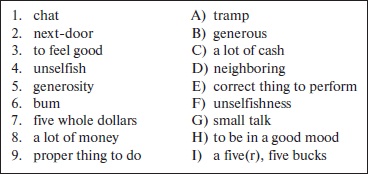 5. Translate from Russian into English: 1. Я сегодня чувствую себя действительно хорошо. 2. Я дала пятидолларовый банкнот бродяге. 3. Это много денег, чтобы вот так просто отдать. 4. Он думал, что это правильный поступок. 5. Он сказал: «Спасибо». Revise English GrammarВ слове unselfish использована одна из наиболее распространенных в английском языке моделей словообразования – с помощью отрицательного префикса. Таких префиксов существует несколько: de-, dis-, im-, in-, un-. 6. Проверьте свои навыки словообразования на основе данной модели. Образуйте слова с противоположным значением, используя отрицательные префиксы: Исходная форма moralize mobile fame frequent charge compose comfort mortal mature able arrange balanced patient generate code certain advantage probable appropriate close courage audible capable compress familiar color decision conscious do moral dependent expected believe load able form effective 7. Render the joke. Section 21 75Th wedding anniversary A very elderly couple is having an elegant dinner to celebrate their 75th wedding anniversary. The old man leans forward and says softly to his wife, «Dear, there is something that I must ask you. It has always bothered me that our tenth child never quite looked like the rest of our children. Now I want to assure you that these 75 years have been the most wonderful experience I could have ever hoped for, and your answer cannot take that all away. But… I must know, did he have a different father?» The wife drops her head, unable to look her husband in the eye, she pauses for moment and then confesses. «Yes. Yes, he did.» The old man is very shaken, the reality of what his wife was admitting hit him harder than he had expected. With a tear in his eye he asks, «Who?.. Who was he? Who was the father?» Again the old woman drops her head, saying nothing at first as she tried to muster the courage to tell the truth to her husband. Then, finally, she says, «You.» Study the words and expressions given below: elegant элегантный, торжественный anniversary годовщина to lean склоняться (к кому-л.) forward вперед soft мягкий; тихий to bother беспокоить tenth десятый to assure уверять wonderful чудесный experience опыт, переживание to drop ронять, опускать to pause делать паузу to shake трясти, сотрясать reality действительность to admit признавать to hit ударять, бить hard трудно, тяжело to expect ожидать tear слеза to muster собираться) I could have ever hoped for (на что) я когда-либо мог надеяться the rest of остаток, остальные to drop one's head опускать голову to muster the courage собраться с духом Exercises to the text1. Answer the questions to the text: 1. How many years have the couple been living together? 2. What had always bothered the old man? 3. What did he think about their marriage in general? 4. What did he want to know for sure? 5. Why did the woman drop her head unable to look into her husband's eye? 6. How many children of the family had a different father? 2. Fill in the blanks with the words from the text: 1. A very elderly _______ is having. 2. The old man leans _______ to his wife. 3. It has always _______ me. 4. Our tenth child never looked like _______ of our children. 5. I want to _______ you this has been the most wonderful experience. 6. The wife _______ her head, unable to look up. 7. The old man is very _______. 8. With a _______ in his eye he asks, «Who?» 3. Match the two parts of the sentences: 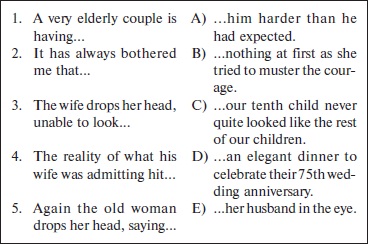 4. Match the words and expressions in the left column to those in the right one: 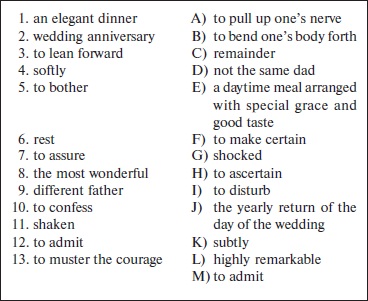 5. Translate from Russian into English: 1. Пара празднует 75-летнюю годовщину своей свадьбы. 2. Дорогая, есть кое-что, о чем я хочу спросить тебя. 3. Это было самое чудесное переживание из тех, на которые я мог когда-либо надеяться. 4. Твой ответ не изменит этого (не заберет это прочь). 5. У него был другой отец? 6. Жена опускает голову. 7. Она медлит мгновение, а потом признается. 8. Реальность того, в чем признается его жена, наносит ему сильный удар. 9. Кто был его отцом? Revise English GrammarВ тексте встречаются прилагательные в двух различных степенях сравнения – сравнительной и превосходной: It has been the most wonderful experience… The reality hit him harder than… Проверьте, как вы владеете навыками использования степеней сравнения прилагательных. При необходимости обратитесь к грамматическому комментарию (раздел 23). 6. Translate from Russian into English: 1. Муж был старше жены на пять лет. 2. Это был в высшей степени элегантный обед. 3. Наш десятый ребенок гораздо выше, чем первый. 4. Его голова (brains) работает лучше, чем у других детей. 5. Он – лучший в семье. 6. Это было самое чудесное переживание в моей жизни. 7. Он был самым непослушным (naughty) из всех детей, когда был маленьким. 8. Слеза на правом глазу намного больше, чем слеза на левом. 9. Ты гораздо глупее (stupid), чем отец остальных детей. 7. Fill in the blanks with prepositions where necessary: 1. A very elderly couple is sitting _______ a restaurant. 2. The old man says softlyh _______ is wife, «Dear, take some _______ this salad.» 3. Our tenth child never quite looked like the rest _______ our children. 4. These years have been the most wonderful experience I could have ever hoped _______. 5. She is unable to look her husband _______ the eye. 6. The wife paused _______ a moment and then confessed. 7. The old man is very shaken _______ the reality what his wife admitted. 8. With a tear _______ his eye he asks, «Who?» 9. She said nothing _______ first, and then she told the truth _______ her husband. 8. Find English equivalents to the Russian words in the scanword: 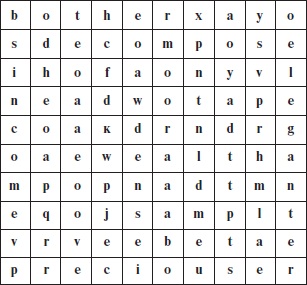 1. (е… ) элегантный, 2. (b… ) беспокоить, 3. (s… ) трясти, сотрясать, 4. (p… ) свойство, качество, 5. (p… ) драгоценный, 6. (w… ) богатство, состояние, 7. (d… ) плотный, 8. (s… ) образец, 9. (d…) разрушаться, разлагаться, 10. (i…) доход. 9. Render the joke. Section 22 The mistress A married couple was enjoying a dinner out when a statuesque brunette walked over to their table, exchanged warm greetings with the husband, and walked off. «Who was that?» the wife demanded. «If you must know,» the husband replied, «that was my mistress.» «Your mistress? That's it! I want a divorce!» the wife fumed. The husband looked her straight in the eye and said, «Are you sure you want to give up our big house in the suburbs, your Mercedes, your furs, your jewelry, and our vacation home in Mexico?» For a long time they continued dining in silence. Finally, the woman nudged her husband and said, «Isn't that Howard over there? Who's he with?» «That's HIS mistress,» her husband replied. «Oh,» she said, taking a bite of dessert. «Ours is much cuter.» Study the words and expressions given below: to enjoy наслаждаться, получать удовольствие statuesque статный, фигуристый brunette брюнетка to exchange обмениваться warm теплый greetings приветствия to demand требовать; спрашивать mistress любовница divorce развод to fume перен. кипятиться, возмущаться straight прямо to give up бросать, отказываться Mercedes «мерседес» furs меха jewelry драгоценности vacation отпуск to continue продолжать to dine обедать silence молчание, тишина to nudge подталкивать локтем bite кусочек dessert десерт ours наша a dinner out обед в ресторане to walk over подойти (к чему-л.) suburbs пригород Exercises to the text1. Answer the questions to the text: 1. Who came over the couple when they were having dinner? 2. What's a brunette? 3. What type of a car does the wife have? 4. Where do they spend their vacation? 5. Whose mistress is better – the husband's or Howard's? 2. Fill in the blanks with the words from the text: 1. A couple was _______ a dinner out. 2. A brunette _______ warm greetings with the husband. 3. I want a _______ ! 4. Do you want _______ our big house in the suburbs? 5. They continued _______ in silence. 6. Finally, the woman _______ her husband. 3. Say if the statement is true or false: 1. A married couple was enjoying a dinner out when an ugly brunette walked over to their table. 2. The husband hit her right in the eye. 3. Are you sure you want to give up our big house in the suburbs? 4. For a long time they continued dining in silence. 5. Finally, the woman nudged her husband. 6. «That's YOUR mistress,» her husband replied. 4. Match the words and expressions in the left column to those in the right one: 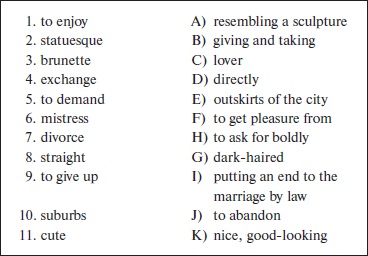 5. Translate from Russian into English: 1. Супружеская пара наслаждалась обедом в ресторане. 2. Если тебе нужно знать, то это моя любовница. 3. Вот как! 4. Муж посмотрел ей прямо в глаза. 5. Ты хочешь расстаться со своим «мерседесом», своими мехами и драгоценностями? 6. Долгое время они продолжали обедать в тишине. 7. С кем он? 8. Наша гораздо лучше. Revise English GrammarГерундиальные и инфинитивные обороты Можно ли в предложении For a long time they continued dining in silence… герундий (dining) заменить на инфинитив (to dine), и какие правила сочетания герундия и инфинитива существуют? Проверьте свои навыки в этом вопросе; при необходимости обратитесь к грамматическому комментарию (раздел 24). 6. Fill in the blanks with a Gerund or an Infinitive: 1. A married couple seemed (enjoy) _______ their dinner. 2. They really enjoyed (have) _______ their dinner all alone. 3. The wife objected to her husband's (drink) _______ too much of champagne. 4. The waiter kept (bring) _______ more and more delicious food. 5. The wife didn't expect her husband (exchange) _______ warm greetings with a woman who appeared (be) _______ a total stranger to her. 6. She insisted on (have) _______ a divorce. 7. Do you want (give up) _______ our big house in the suburbs? 8. She didn't mind (have) _______ a mistress who was much cuter than that of Howard's. Revise English GrammarВ предложении Ours is cuter… используется так называемая абсолютная форма притяжательного падежа личного местоимения we. Проверьте навыки использования данной формы, при необходимости обращаясь к грамматическому комментарию (раздел 25). 7.Translate into English: 1. – У Говарда большой дом. – Наш больше. 2. – У жены Говарда много драгоценностей. – Твои дороже. 3. – У Говарда новая машина. – Моя новее. 4. – У Говарда хорошая любовница. – Наша лучше. 8.Render the joke. Section 23 Marriage counselor 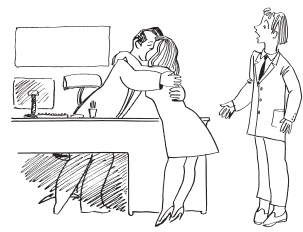 After just a few years of marriage, filled with constant arguments, a young man and his wife decided the only way to save their marriage was to try counseling. They had been at each other's throat for some time and felt that this was their last straw. When they arrived at the counselor's office, the counselor jumped right in and opened the floor for discussion. «What seems to be the problem?» Immediately, the husband held his long face down without anything to say. On the other hand, the wife began talking 90 miles an hour describing all the wrongs within their marriage. After 5—10—15 minutes of listening to the wife, the counselor went over to her, picked her up by her shoulders, kissed her passionately for several minutes, and sat her back down. Afterwards, the wife sat there speechless. He looked over at the husband who was staring in disbelief at what had happened. The counselor spoke to the husband, «Your wife NEEDS that at least twice a week!» The husband scratched his head and replied, «I can have her here on Tuesdays and Thursdays.» Study the words and expressions given below: a few несколько constant постоянный arguments споры to counsel советовать, консультировать counselor советник, консультант counseling консультирование immediately немедленно wrongs недостатки, неудобства, дефекты within внутри shoulder плечо to kiss целовать passionately страстно afterwards после, впоследствии speechless безгласный, безмолвный disbelief недоверие to scratch скрести, чесать to be at sb's throat перен. быть готовым взять кого-л. за горло to jump in зд. сразу приступить к делу to open the floor for discussion открыть обсуждение on the other hand с другой стороны (on the one hand с одной стороны) to talk 90 miles an hour болтать со скоростью 90 миль в час last straw последняя соломинка at least по крайней мере Exercises to the text1. Answer the questions to the text: 1. What was the couple's marriage filled with? 2. What did they think to be the only way to save their relationships? 3. What did the counselor do when they arrived at the office? 4. Why did the husband hold his face down? 5. How fast did the wife speak? 6. How did the wife act after the counselor had kissed her? 7. How often did the wife have to visit the counselor's office? 2. Fill in the blanks with the words from the text: 1. These years were filled with _______ arguments. 2. They decided that _______ way to save their marriage was to _______ counseling. 3. They had been at each other's _______ for some time. 4. They felt that this was their _______ straw. 5. When they arrived at the office, the counselor _______ right in and opened the floor for discussion. 6. What _______ to be the problem? 7. The husband held his long face down _______ anything to say. 3. Match the two parts of the sentences: 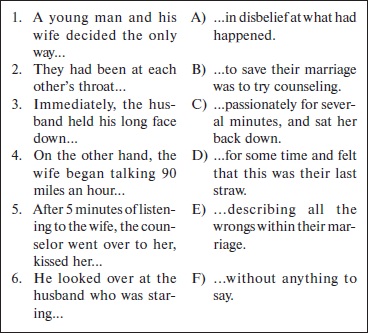 4. Match the words and expressions in the left column to those in the right one: 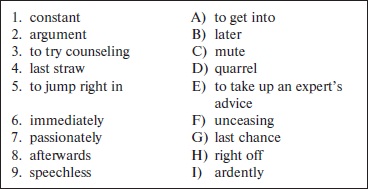 5. Translate from Russian into English: 1. Жена, напротив, принялась описывать все недостатки их брака. 2. Послушав жену, он поднял ее за плечи. 3. Он страстно целовал ее в течение нескольких минут и посадил назад. 4. Потом жена сидела молча. 5. Он взглянул на мужа, который уставился с недоверием на то, что произошло. 6. Консультант предложил мужу делать это по крайней мере дважды в неделю. 7. Муж почесал голову. Revise English GrammarВ предложении After just a few years of marriage… используется словосочетание a few («немного»), которое нельзя путать с прилагательным few, а также с другими словами и конструкциями, выражающими близкие значения (little, a little). Проверьте, насколько хорошо вы знаете правила использования этих слов и словосочетаний. При необходимости воспользуйтесь грамматическим комментарием (раздел 26). 6. Fill in the blanks with a word from the list: few a few little a little Follow the directions given in brackets: 1. They spent very (мало) _______ days without heated arguments. 2. They had (мало) _______ hope to save their marriage. 3. The counselor was (немного) _______ surprised when he heard the couple's story. 4. He thought there was (мало) _______ hope left, but still he agreed to help. 5. After (немного) _______ visits to the counselor's office they felt better. 6. When she began to speak, he understood very (мало) _______ , so fast she spoke. 7. And only (немного) _______ words were intelligible. 8. She sat silently (немного) _______ minutes, and then they left. 7. Fill in the blanks with proper forms of the verbs: 1. If we (not to try) _______ counseling, our marriage will end up in a divorce. 2. If you (to argue) _______ with me any more, I will leave you forever. 3. As soon as you (to understand) _______ that it's our last straw, things will turn for the better. 4. You've got to tell me, when you (to go) _______ to visit the counselor tomorrow. 5. When you (to arrive) _______ at the counselor's office, the counselor will jump right in and open the floor for discussion. 6. If she (not to stop) _______ talking 90 miles an hour, I will have to stop her by a kiss. 7. She will continue talking her head off until you (to kiss) _______ her. 8. I will bring her here every Tuesday if she (to agree) _______. 8. Render the joke. Section 24 Cat food One woman has her bridge club every Thursday night and after a peaceful game or two with the ladies, she goes home to fix her husband dinner when he gets home from work. Well, one Thursday, she's playing a great game and she has an incredible hand when she notices the time. «Oh, no! I have to go fix my husband his dinner! He's going to be so angry if it's not ready on time.» And she dashes out of her friend's house, her great hand forgotten on the table. When she gets home, she realizes she has very little time, not enough time to go to the supermarket, and all she has in the cupboard is a wilted lettuce leaf, an egg, and a can of cat food. In a panic, she opens the can of cat food, stirs in the egg, and garnishes it with the lettuce leaf just as her husband is pulling up. She watches in horror as he sits down to his dinner, and then she realizes he is loving it! «Mmmm, darling, this is the best dinner you have made for me in forty years of marriage. You can make this for me any old day, mmmmm!» She was very pleased at being praised, and that night they had sex for the first time in months, and it was great! Needless to say, every Thursday from then on, she made this dinner for her husband. She tells her bridge cronies about it and they are all horrified. «You're going to kill him,» they said, but she continued to make him his cat food dinner. Two months later, her husband died, and after the funeral all the Thursday bridge women attacked our new widow for being so callous. «You killed him! We told you that feeding him that cat food every week would do him in! How can you just sit there so calmly and play bridge knowing you murdered your husband?» The wife stoically replied, «Ahh, I didn't kill him. He fell off the mantel when he was licking his ass.» Study the words and expressions given below: bridge карт. бридж club клуб peaceful мирный to fix делать, устраивать, готовить incredible невероятный to dash броситься wilted увядший / вялый lettuce салат to stir in размешивать (с чем-л.) egg яйцо to garnish украшать гарниром to pull up подъезжать horror ужас to please доставлять удовольствие to praise хвалить crony приятельница, приятель to horrify ужасать funeral похороны widow вдова callous бессердечный feeding кормление to murder убить stoically стоически mantel камин to lick лизать ass груб. задница incredible hand карт. невероятно легкая рука у игрока (невероятное везение) Needless to say Нет нужды говорить to do sb in сленг убить кого-л. Exercises to the text1. Answer the questions to the text: 1. How often did the lady have her bridge game in the club? 2. Where did she have to hurry after the game? 3. What did she have in the cupboard when she returned home one Thursday after she had had an incredible hand? 4. Why did she watch her husband in horror when he was sitting to dinner? 5. What was the side-effect of the cat food? 6. What did the bridge women attack the lady for? 2. Fill in the blanks with the words from the text: 1. She goes home _______ her husband dinner when he gets home from work. 2. Well, one Thursday, she has an _______ hand. 3. And she _______ out of her friend's house. 4. All she has in the cupboard is a _______ lettuce leaf. 5. She watches in _______ as he sits down to his dinner. 6. She tells her bridge _______ about it and they are all horrified. 7. After the _______ all attacked our new widow. 3. Say if the statement is true or false: 1. I have to go fix my husband his dinner! 2. And she dashes out of the Bingo club, her great hand forgotten on the table. 3. In a panic, she opens the can of cat food. 4. She watches with joy as he sits down to his dinner. 5. Needless to say, every day from then on, she made this dinner for her husband. 6. She tells her bridge cronies about it and they are all delighted. 4. Match the words and expressions in the left column to those in the right one: 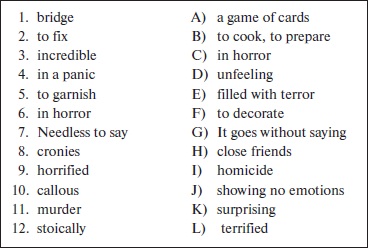 5. Translate from Russian into English: 1. Она едет домой, чтобы приготовить своему мужу обед. 2. Ей невероятно везет, когда она обращает внимание на время. 3. Она бросается вон из дома своей подруги. 4. Она осознает, что у нее очень мало времени. 5. Все, что у нее есть в буфете, это завядший / вялый лист салата, яйцо и банка кошачьего корма. 6. С ужасом она наблюдает, как ее муж садится за обед / обедать. 7. Нет нужды говорить, что с этого дня каждый четверг она готовила этот обед. 8. Мы говорили тебе, что кормление его этим кошачьим кормом убьет его. Revise English GrammarВ предложении She was very pleased at being praised… используется герундиальный оборот, в который включена пассивная форма герундия; в предложении We told you that feeding him that cat food every week… стоит активная форма герундия. Проверьте, насколько хорошо вы владеете навыками использования этих форм; при необходимости обратитесь к грамматическому комментарию (раздел 27). 6. Fill in the blanks with either an active or a passive form of the Gerund: 1. Her husband insisted on (to give) _______ good healthy food for his dinner. 2. She couldn't help (to stay) _______ in the club until the game was over. 3. He was looking forward (to serve) _______ that cat food for his dinner. 4. She didn't object at all to his (to climb) _______ the mantel whenever he wanted. 5. He did not mind (to feed) _______ cat food at all . 6. She enjoyed (to play) _______ bridge with the ladies. 7.Transform Indirect Speech into Direct Speech by making necessary changes: 1. She told her cronies that she had to go home and fix her husband his dinner. 2. He asked her if she had had an incredible hand in bridge. 3. She said that her husband was going to be angry if it was not ready on time. 4. He said that that was the best dinner she had ever made for him in forty years of marriage. 5. He asked her to make that for him any old day. 6. They said that the woman was going to kill her husband. 7. The ladies said that she had really killed him with the cat food. 8. She asked her cronies not to blame her for it. 8. Find English equivalents to the Russian words in the scanword: 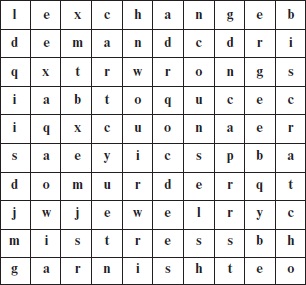 1. (1… ) салат, 2. (g… ) украшать, 3. (m… ) убийство, 4. (с… ) советовать, консультировать, 5. (w… ) недостатки, недочеты, 6. (s… ) чесать, 7. (е… ) обмениваться, 8. (d… ) требовать, 9. (m… ) любовница, 10. (j… ) драгоценности. 9. Render the joke. Section 25 Football wedding Two guys are talking about their boss's upcoming wedding. One says, «It's ridiculous, he's rich, but he's 93 years old, and she's just 26! What kind of a wedding is that?» The other says, «Well, we have a name for it in my family.» «What do you call it?» «We call it a football wedding.» The first asks, «What's a football wedding?» The other says, «She's waiting for him to kick off!» Study the words and expressions given below: upcoming приближающийся ridiculous нелепый to kick off футб. делать первый удар в начале игры; зд. сленг умереть, сыграть в ящик Exercises to the text1. Answer the questions to the text: 1. What were the guys talking about? 2. Why did they think the upcoming wedding ridiculous? 3. What name for a wedding of this sort do they have in the family? 4. Was the boss a good football player? 2. Fill in the blanks with the words from the text: 1. Two guys are talking about their boss's _______. 2. It's _______, he's 93 years old. 3. What _______ of a wedding is that? 4. What do you _______ it? 5. The girl's waiting for him to _______! 3. Match the two parts of the sentences: 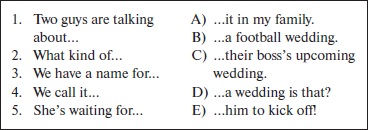 4. Match the words and expressions in the left column to those in the right one: 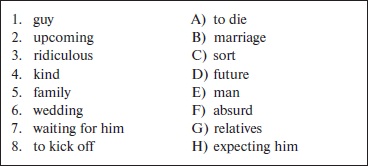 5. Translate from Russian into English: 1. Ей только 26 лет! 2. У нас в семье есть название для этого. 3. Мы называем это футбольной свадьбой. Revise English GrammarОдин из участников разговора обозначен в тексте как The other… Проверьте свои навыки использования прилагательного other и производных от него слов another, the other, others. При необходимости обратитесь к грамматическому справочнику (раздел 28). 6.Fill in the blanks with missing words; follow the directions given in brackets: 1. He has divorced recently, and he just wants to get himself (другую) _______ wife. 2. All (другие) _______ wives that he has had were also much younger than he was. 3. (Еще одна) _______ wedding, and he will really kick off. 4. Two guys turned up at the wedding; one was the bestman, (другой) _______ was his friend. 5. About half a hundred people invited to the wedding managed to get into the church; (другие) _______ had to wait outside. 7.Render the joke. Section 26 Happy birthday present 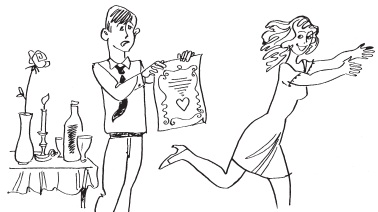 A fellow was talking to his buddy, and he said, «I don't know what to get my wife for her birthday. She has everything, and besides, she can afford to buy anything she wants, so I'm stumped.» His buddy said, «I have an idea. Why don't you make up a certificate saying she can have 60 minutes of great sex, any way that she wants it. If you did it, she'd probably be thrilled.» So the fellow did. The next day his buddy asked, «Well? Did you take my suggestion?» «Yes, I did,» said the fellow. «…And did she like it?» his buddy asked. "Oh yes! She jumped up, thanked me, kissed me on the forehead and ran out the door yelling, 'I'll be back in an hour!!!' " Study the words and expressions given below: to get sb sth дать кому-л. что-л. besides кроме того to afford позволять себе to stump разг. ставить в тупик certificate свидетельство, сертификат to thrill доставлять сильное удовольствие, сильно и остро возбуждать suggestion предложение forehead лоб to yell вопить Exercises to the text1. Answer the questions to the text: 1. Who was the fellow talking to? 2. Why didn't he know what to get his wife for her birthday? 3. What sort of a certificate did the fellow's buddy suggest that he do? 4. Why did he think that the wife would be thrilled? 5. Did the fellow take the buddy's suggestion and what came out of it? 2. Fill in the blanks with the words from the text: 1. A _______ was talking to his buddy. 2. She has everything, and _______, she can _______ to buy anything. 3. Make up a _______. 4. If you did it, she'd probably be _______. 5. Did you take my _______? 6. She jumped up, thanked me, kissed me on the _______ and ran out. 3. Say if the statement is true or false: 1. I don't know what to get my wife for her birthday. 2. Why don't you make up a certificate saying she can have one minute of great sex. 3. If you did it, she'd probably divorce you. 4. So the fellow did. 5. She jumped up, thanked me, kissed me on the forehead and ran out. 6. I'll be back in a minute! 4. Match the words and expressions in the left column to those in the right one: 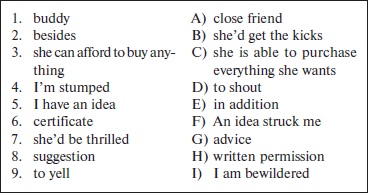 5. Translate from Russian into English: 1. Я не знаю, что подарить своей жене на ее день рождения. 2. Я в тупике. 3. У меня есть идея. 4. Парень так и сделал. 5. Она выбежала из двери с воплем: «Я вернусь через час!!!» Revise English GrammarВ предложении If you did it, she'd probably be thrilled… используются глаголы в форме так называемого сослагательного наклонения. Проверьте свои навыки употребления данной формы; при необходимости воспользуйтесь грамматическим комментарием (раздел 29). 6. Fill in the blanks with appropriate forms of the verbs given in brackets: 1. If I (to know) _______ what to get my wife for her birthday, I would be really happy. 2. If she (to need) _______ something, she would have told me. 3. I (not to be stumped) _______, if she told me what she wants. 4. She would be even more thrilled, ifyou (to do) _______ it yourself. 5. If I hadn't taken your suggestion, people (not to make) _______ fun of me. 6. She (to be) _______ back in an hour, if she hadn't met you on the way. 7. If you (not to be) _______ so stupid, you wouldn't have made up a certificate of this sort. 7. Render the joke. Section 27 How much to marry us? Tom wished his wife were more attractive, but she wasn't. To tell the truth, he was no oil-painting, either. After the ceremony, Tom asked the minister how much the cost was. «Just give me what you think it is worth to have this lady for your wife,» replied the minister. Tom looked at his wife, and handed the minister $50. The minister looked at Tom's wife and gave him $42 change. Study the words and expressions given below: wishжелать attractive привлекательный oil нефть; масло to paint писать маслом; красить painting живопись oil-painting масляная живопись; зд. картина маслом ceremony церемония minister священник cost издержки, цена to hand передавать, протягивать change сдача, мелкая монета what it is worth to have (sth) сколько стоит иметь (что-л.) to tell the truth по правде говоря Exercises to the text1. Answer the questions to the text: 1. How did Tom's wife look? 2. Was he much different? 3. What did he ask the minister about after the ceremony was over? 4. How did the minister estimate the cost of the wedding? 5. Why were Tom's numbers different? 2. Fill in the blanks with the words from the text: 1. Tom's wife wasn't very _______. 2. He was no, either _______. 3. How much is the _______ of the ceremony? 4. Give me what it is _______ to have this lady for your wife. 5. Tom _______ the minister $50. 6. The minister gave him $42. 3. Match the two parts of the sentences: 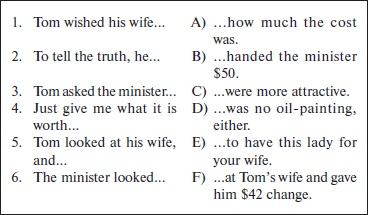 4. Match the words and expressions in the left column to those in the right one: 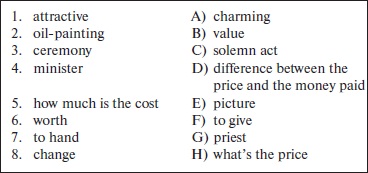 5. Translate from Russian into English: 1. После церемонии Том спросил священника, сколько это стоит. 2. Просто дай мне столько, сколько, как ты думаешь, стоит твоя жена. 3. Ты хочешь иметь эту даму в качестве жены? 4. Том посмотрел на жену и протянул священнику 50 долларов. 5. Священник посмотрел на жену Тома и дал 42 доллара сдачи. Revise English GrammarВ предложении Tom wished his wife were more attractive… используется одна из фразеологических конструкций, с помощью которых вводится сослагательное наклонение. Проверьте свои навыки использования данных конструкций, в случае необходимости обращаясь к грамматическому комментарию (раздел 30,). 6. Translate from Russian into English: 1. Жаль, что я не живописное полотно. 2. Пора бы мне жениться. 3. Если бы только он сказал мне вчера, сколько это стоит. 4. Жаль, что вы дали мне так много денег. 5. Пора бы вам дать мне 42 доллара сдачи. 6. Если бы он только посмотрел на нее перед тем, как вести в церковь. 7. Find English equivalents to the Russian words in the scanword: 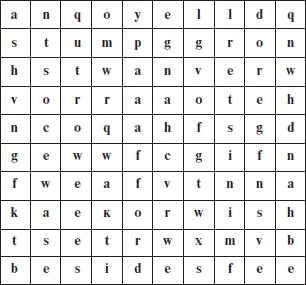 1. (w… ) желать, 2. (а… ) привлекательная, 3. (m… ) священник, 4. (с… ) сдача, 5. (а… ) позволять себе, 6. (s… ) ставить в тупик, 7. (с…) стоить, 8. (b…) кроме этого, 9. (у…) вопить, 10. (h… ) протягивать, давать. 8. Render the joke. Section 28 Reverse roles Mary was married to a male chauvinist. They both worked full time, but he never did anything around the house and certainly not any housework. That, he declared, was woman's work. But one evening Mary arrived home from work to find the children bathed, a load of wash in the washing machine and another in the dryer, dinner on the stove and a beautifully set table, complete with flowers. She was astonished, and she immediately wanted to know what was going on. It turned out that Charley, her husband, had read a magazine article that said that working wives could be more romantically inclined if they weren't so tired from having to do all the housework in addition to holding down a fulltime job. The next day, she couldn't wait to tell her friends in the office. «How did it work out?» they asked. «Well, it was a great dinner,» Mary said. «Charley even cleaned up, helped the kids with their homework, folded the laundry and put everything away.» «But what about afterward?» her friends wanted to know. «It didn't work out,» Mary said. «Charley was too tired.» Study the words and expressions given below: chauvinist шовинист male chauvinist мужской шовинист; человек, отстаивающий права мужчин to declare заявлять to batheкупать load груз wash стирка dryer сушилка stove плита (газовая или электрическая) to astonish удивлять, изумлять magazine журнал article статья to incline склоняться (к чему-л.) to fold складывать laundry белье для или после стирки afterward впоследствии, потом around the house по дому, в доме full-time work работа на полный рабочий день (на ставку) to set the table накрывать стол complete with sth законченный, завершенный (чем-л.) to turn out являться, неожиданно появляться, оказываться in addition в дополнение to hold down осуществлять, придерживаться, выполнять to work out получаться, осуществляться to clean up убирать со стола to help sb with sth помогать кому-л. в чем-л. Exercises to the text1. Answer the questions to the text: 1. What sort of a man was Mary married to? 2. Why didn't he do any work around the house? 3. Why was Mary astonished when she arrived home one evening after work? 4. What made Charley do all the work about the house and, in addition, cook a dinner? 5. What didn't work after all, and why? 2. Fill in the blanks with the words from the text: 1. They both worked _______ time. 2. Housework, he _______, was woman's work. 3. Mary found the children _______. 4. A load of _______ was in the dryer. 5. She was _______ . 6. It _______ that Charley had read a magazine article. 7. Working wives could be more _______ inclined if they weren't so tired. 8. They had to do all the housework into holding down a full-time job. 9. Charley helped the _______ with their homework. 3. Say if the statement is true or false: 1. He always did everything around the house and certainly all the housework. 2. One evening Mary arrived home from work to find the children bathed. 3. She immediately wanted to know what was going on. 4. The next day, she couldn't tell her friends in the office about it. 5. Well, it was a great breakfast. 6. Charley cleaned up and helped the kids with their homework. 4. Match the words and expressions in the left column to those in the right one: 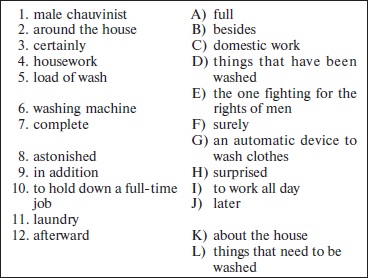 5. Translate from Russian into English: 1. Он никогда не делал ничего по дому. 2. Мэри приехала домой с работы и обнаружила, что стиральная машина загружена. 3. На плите был обед, а стол был прекрасно сервирован и украшен цветами. 4. Она немедленно захотела узнать, что происходит. 5. В статье говорилось, что работающие жены могли бы быть более романтически настроенными. 6. Кроме того, у нее была работа на полный рабочий день. 7. Она не могла дождаться, когда расскажет своим приятельницам в офисе. 8. А что было потом? Revise English GrammarВ предложении The article said that working wives could be more romantically inclined if they weren't so tired from having to do all the housework… сослагательное наклонение основано на использовании глагола could в первой части предложения. Кроме глагола could, в подобного рода конструкциях может использоваться глагол might. При этом изменяется значение конструкции. Проверьте свои навыки использования данных глаголов; при необходимости обратитесь к грамматическому комментарию (раздел 31). 6. Translate from Russian into English: 1. Если бы он любил свою жену, он делал бы работу по дому. 2. Если бы она не уставала так на работе, она могла бы быть романтически настроена каждый день. 3. Если бы она приехала с работы раньше, у него не было бы времени сделать всю работу по дому. 4. Если бы у них были бабушка или дедушка, они могли бы присматривать за детьми. 5. Если бы он не прочитал этот журнал, он вряд ли приготовил бы обед. 6. Если бы он не устал, это бы сработало. 7.Turn the sentences into Active: 1. All the housework is done by Mary. 2. The children were bathed by the husband. 3. The table has been laid by Charley. 4. Mary was astonished by what she saw. 5. The laundry is being folded by Mary herself. 8.Render the joke. Section 29 We fight so much Two Yuppettes were shopping. When they started to discuss their home lives, one said, «Seems like all Alfred and I do anymore is fight. I've been so upset, I've lost 20 pounds.» «Why don't you just leave him then?» asked her friend. «Oh! I'd rather not,» the first replied. «Not yet. I'd like to lose at least another fifteen pounds first.» Study the words and expressions given below: yuppette сленг yuppie(a young urban professional) молодой горожанин-профессионал (ette – уменьшительный суффикс) upset грустный, опечаленный pound фунт seems like all we do anymore is fight похоже, что все, что мы теперь делаем, это ругаемся I'd rather not я бы не стала Exercises to the text1. Answer the questions to the text: 1. What is a yuppie? 2. What were the yuppies doing? 3. Who's Alfred? 4. What are Alfred and his girl doing all the time? 5. What's the advantage of this way of life? 2.Fill in the blanks with the words from the text: 1. Two Yuppettes were _______. 2. They started to discuss their _______ lives. 3. Seems _______ all we do anymore is fight. 4. I've _______ 20 pounds. 5. Why don't you _______ leave him? 6. I'd _______ not. 3. Match the two parts of the sentences: 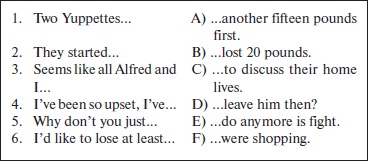 4. Match the words and expressions in the left column to those in the right one: 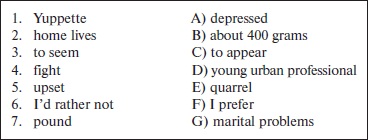 Translate from Russian into English: 1. Это меня так расстраивает. 2. Почему ты его не оставишь? 3. Пока нет. 4. Я бы хотела сперва сбросить еще пятнадцать фунтов. Revise English GrammarВ предложении I'd rather not… (Iwould rather…) используется конструкция, с помощью которой в сослагательном наклонении выражается предпочтение. Близкой по значению, но наделенной иными смысловыми нюансами, является конструкция I'd better (I had better). Проверьте навыки использования данных конструкций. При необходимости обратитесь к грамматическому комментарию (раздел 32). 6. Translate from Russian into English: 1. Я бы предпочел, чтобы ты пошла в магазин. 2. Нам бы не следовало обсуждать наши домашние обстоятельства. 3. Вам бы не следовало ругаться все время. 4. Я бы предпочла потерять 20 фунтов, чем быть толстой (fat). 5. Тебе следовало бы бросить его. 6. Я бы предпочла не отвечать. 7.Render the joke. Section 30 Why didn't you say anything, mother? 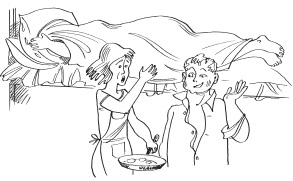 A man used to work night shift. Once he returned home and went straight up to the bedroom. He found his wife with the sheet pulled over her head, fast asleep. Not to be denied, the horny husband crawled under the sheet and proceeded to make love to her. Afterward, as he hurried downstairs for something to eat, he was startled to find breakfast on the table and his wife pouring coffee. «How did you get down so fast?» he asked. «We were just making love!» «Oh my God,» his wife gasped. «That's my mother up there! She came over early and had complained of having a headache. I told her to lie down for a while.» Rushing upstairs, the wife ran to the bedroom. «Mother, I can't believe this happened. Why didn't you say anything?» The mother-in-law huffed, «I haven't spoken to that jerk for fifteen years, and I wasn't about to start now!» Study the words and expressions given below: shift зд. рабочая смена sheet простыня to pull тянуть to pull over натягивать (на что-л.) asleep спящий to deny отрицать, отвергать to crawl вползать, пробираться ползком to proceed приступать to hurry спешить to startle испугать, поразить, сильно удивить to complain of sth жаловаться (на что-л.) headache головная боль downstairs внизу; вниз по лестнице; на нижнем этаже to rush бросаться upstairs вверху; вверх по лестнице; на верхнем этаже mother-in-law теща, свекровь to huff говорить гневно jerk сленг дурак и бездельник night shift ночная смена fast asleep крепко спящий not to be denied чтобы его не отвергли for a while в течение некоторого времени to be about to do sth собираться что-л. делать Exercises to the text1. Answer the questions to the text: 1. Where did the man return from? 2. Why did he proceed to make love to the lady without saying a single word? 3. What was he startled at when he got downstairs? 4. Why did the wife gasp? 5. What was wrong with her mother? 6. Why didn't the mother-in-law say a single word while being made love to? 2. Fill in the blanks with the words from the text: 1. The man went _______ to the bedroom. 2. He found his wife _______ asleep. 3. The horny husband _______ under the sheet. 4. He hurried _______ for something to eat. 5. How did you get down so _______? 6. She came over early and had _______ of having a headache. 7. I can't _______ this happened. 3. Say if the statement is true or false: 1. He found his wife with the sheet pulled over her head, fast asleep. 2. The husband crawled under the sheet and proceeded to make coffee to her. 3. He hurried downstairs for something to read, and was startled to find breakfast on the table and his wife pouring coffee. 4. We were just making love! 5. That's my father up there! 6. She came over early and had complained of having a headache. 7. I told her to stand still for a while. 4. Match the words and expressions in the left column to those in the right one: 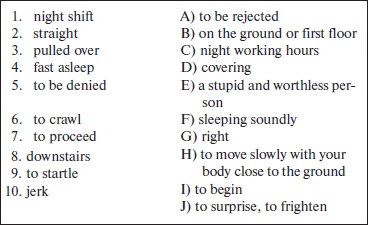 5. Translate from Russian into English: 1. Мужчина вернулся домой с ночной смены. 2. Он обнаружил свою жену с простыней, натянутой на голову. 3. Чтобы его не отвергли, он заполз под простыню. 4. Он был обеспокоен, найдя завтрак на столе. 5. «О Боже мой, – жена от волнения едва не задохнулась, – там же наверху моя мать!» 6. Я велела ей немного полежать. 7. Жена бросилась наверх. Revise English GrammarВ предложениях Afterward he hurried downstairs for something to eat… и Why didn't you say anything? используются производные от местоимений some и any слова something и anything, употребление которых определяется соответствующими нормами. Проверьте, насколько хорошо вы знаете эти нормы. В случае необходимости обратитесь к грамматическому комментарию (раздел 33). 6. Fill in the blanks with appropriate words following the directions given in brackets: 1. Did the man find (кого-нибудь) _______ in the bedroom? 2. Yes, he found (кое-кого) _______ there. 3. Did he notice (что-нибудь) _______ strange about the woman in bed? 4. No, there was (что-то) _______ on her head so he couldn't see the face. 5. His wife was (где-то) _______ downstairs. 6. She was preparing (что-то) _______ for her husband to eat. 7. Did his wife tell (что-нибудь) _______ to her mother? 8. After he learnt what had happened, he could eat (ничего) _______. Revise English GrammarВ предложении A man used to work night shift… глагол to use используется в значении «имел обыкновение» в конструкции, всегда стоящей в прошедшем времени. Проверьте свои знания различных вариантов использования этого глагола. При необходимости обратитесь к грамматическому комментарию (раздел 34). 7. Translate from Russian into English: 1. Его жена привыкла лежать в постели с простыней, натянутой на голову. 2. Я имел обыкновение пробираться под простыню. 3. Она использует простыню, чтобы накрывать лицо. 4. Он привык завтракать рано утром после работы. 5. Жена обычно готовила завтрак к семи. 6. Я использую сковороду, чтобы приготовить мясо. 7. Он привыкнет к присутствию тещи в постели жены. 8.Translate into English: 1. Если бы она не натянула простыню на голову, он бы ее узнал. 2. Если бы он работал в дневную смену, ничего бы не случилось. 3. Если бы она была в спальне, она не успела бы приготовить завтрак так быстро. 4. Если бы у нее не болела голова, она не натянула бы простыню на голову. 5. Если бы она заговорила, она нарушила бы правило, которое установила для себя. 9. Find English equivalents to the Russian words in the scanword: 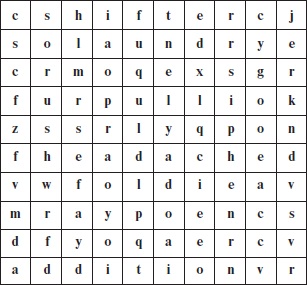 1. (с… ) жаловаться, 2. (s… ) рабочая смена, 3. (j… ) дурак и бездельник, 4. (d… ) отрицать, отвергать, 5. (1… ) стирка, 6. (а… ) дополнение, 7. (h… ) головная боль, 8. (r… ) бросаться, 9. (р… ) натягивать, 10. (f… ) складывать. 10. Render the joke. |
|
||
|
Главная | В избранное | Наш E-MAIL | Прислать материал | Нашёл ошибку | Верх |
||||
|
|
||||
